
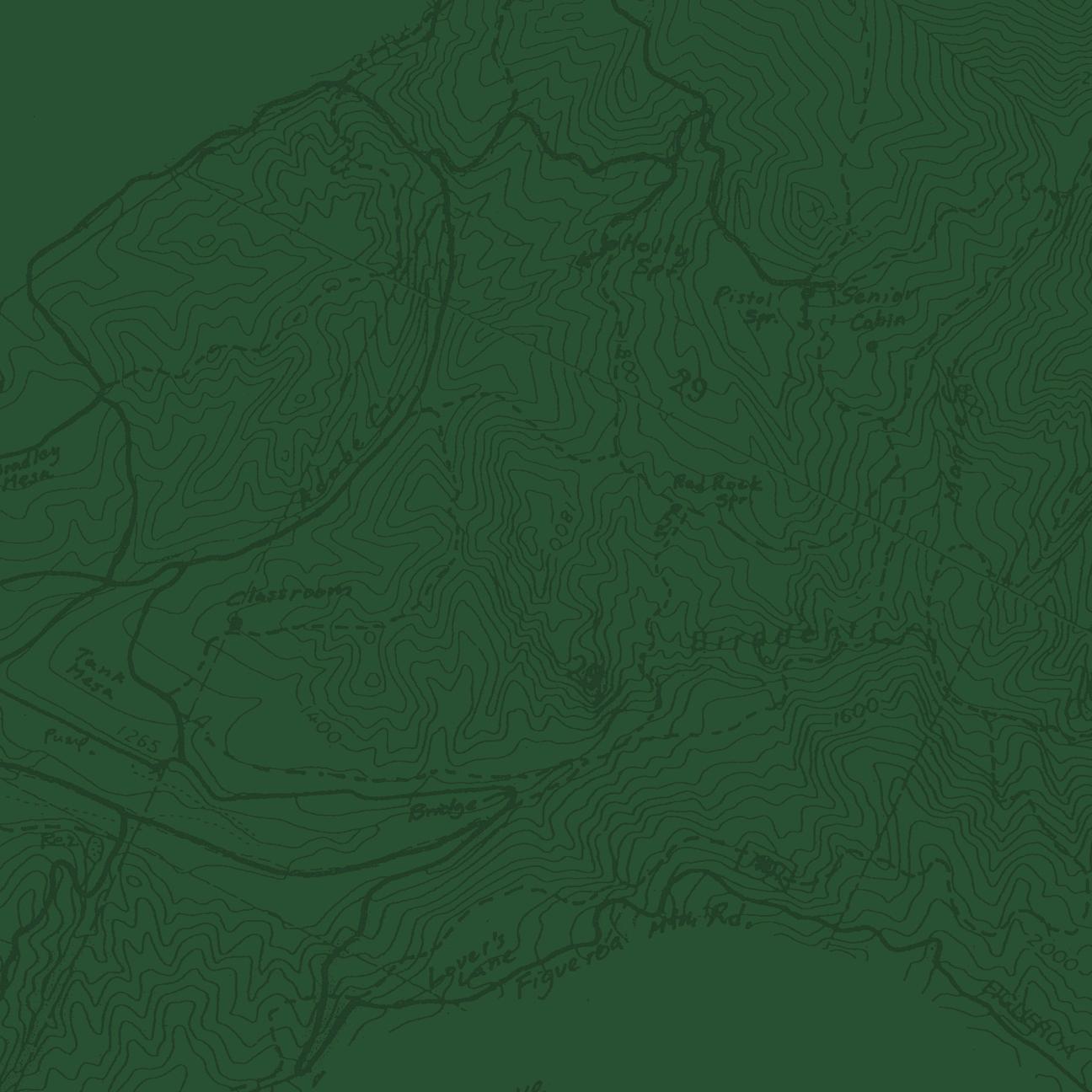



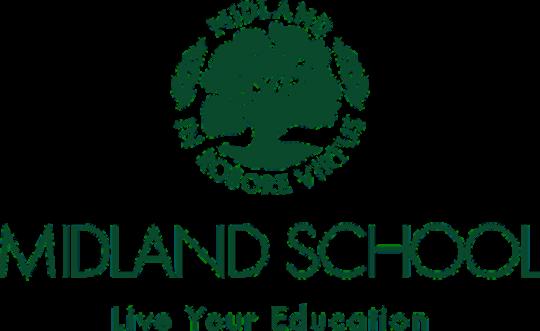
EditedandPublishedby:
EllieMoore,AssociateHeadofSchool Allrightsreserved
©2024MidlandSchool
Images&Designby: EmmaMunger‘08
JohnLichtwardtPhotography
LureDigital
TheMidlandCommunity
“Anenvironmentalistlongbeforewehadawordforit, PaulSquibbneverstoppedtakingpersonalresponsibility forhissurroundings,immediateorremote.
Theassertionthatonepersoncannotchangetheworld seemedsopatheticallysillytohimthatitwasliableto provokeonlygood-naturedfrowninglaughter,asifthe suggestionhadbeenmadeteasingly,inmockignorance. Hereveledinparadox,butheldonetruthtobesimply andalwaystrue:itmatterswhatwedo.”
GaryLewis‘45(1927-2012) DominionOverPalmandPine: PaulSquibbandHisStudents
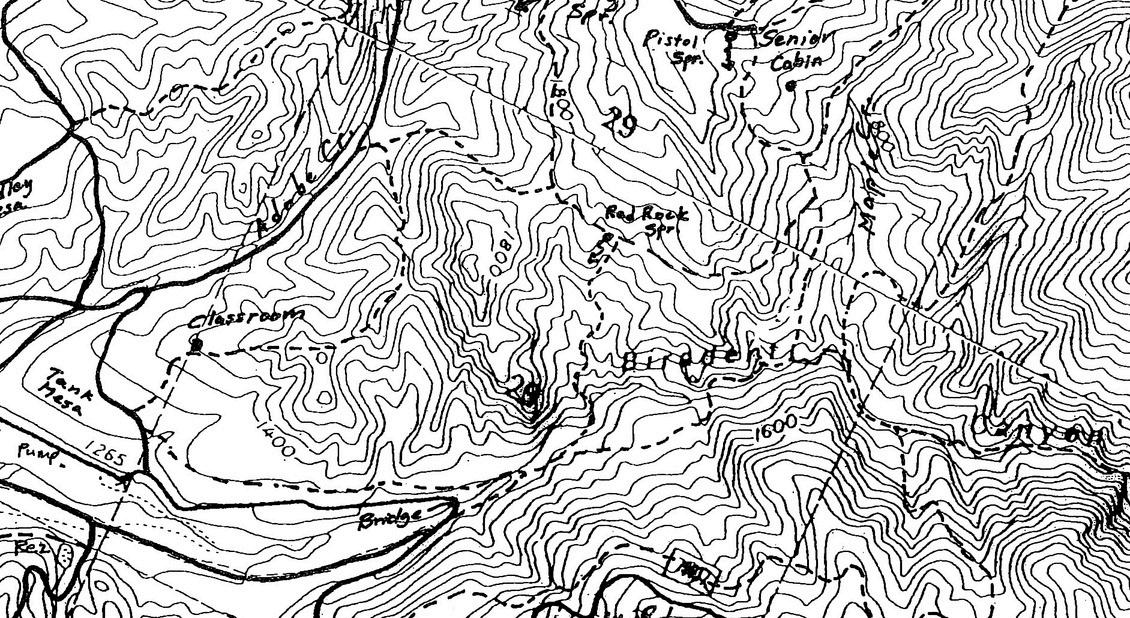

Junior Leadership Seminar
Farm Internship
Horse & Ranch Internship
Experiential Saturdays
MIDterm Week
Experiential Week
Leadership
Jobs Program
Stewards Program
Trail Boss
Prefectships
Club & Affinity Group Leadership
Workshop Leadership
Sports & Experiential Activities
Competitive Sports
Basketball
Cross Country
Soccer
Volleyball

Non-Competitive Activities
Circus
Farm
Fitness, Running, Surfing, Hiking
Horse Program
Maintenance
Outdoor Leadership
College Counseling
9th, 10th, & 11th Grades
11th Grade Spring Seminar
12th Grade Fall Seminar Family
Midland School provides a unique college preparatory boarding school experience to a diverse student body. Through study and work, it teaches the value of a lifetime of learning, self-reliance, simplicity, responsibility to community and the environment, and love for the outdoors.
Midland School is a community of students, teachers, and families in pursuit of academic excellence and moral lives. We are guided by the following principles:
The essential ingredients of learning are a student, a teacher, and and an idea.
A high-quality college preparatory education should be accessible to families of all economic means.
A simple, self-reliant lifestyle, close to nature, teaches us to develop our inner resources, to distinguish between needs and wants, and to appreciate life’s fundamental joys and challenges.
A school community entrusting students with authentic leadership roles, emphasizing individual and collective responsibility, and relying on its own work to meet its basic needs, prepares students to take care of themselves and to serve others. Connection to the environment, through academic education and everyday examples, teaches students to be good stewards of the earth.
From the farm to the classroom, Midland’s curriculum prioritizes learning through experience. Rooted in the belief that college preparatory schooling should be education not for any specific test but for life itself, we provide rigorous academics that are grounded in seven key core competencies. Together with our mission and philosophy, the following competencies are imbued in every aspect of Midland programming, and guide the way we choose to spend our days. By consistently applying these core competencies to every class and activity, students gain a clearer understanding of their strengths and areas for continued growth - and are better equipped to become autonomous leaders of their own learning, and their own lives. The Portrait of the Graduate, represents the big picture key skills we strive for all of our students to become proficient in before they leave Midland for the great world beyond.



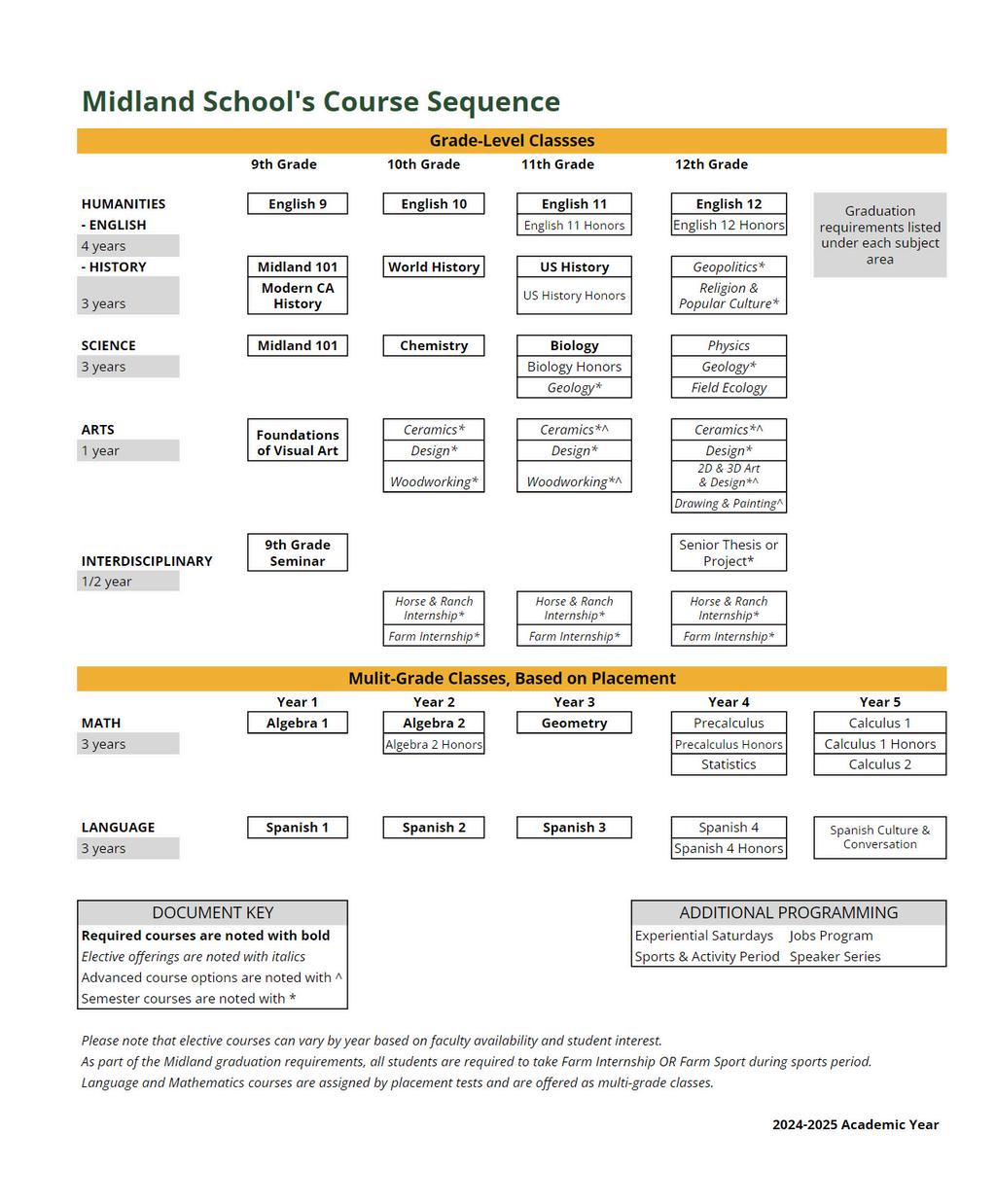

Students’ grades at Midland are a reflection of their demonstrated proficiency in core content knowledge and skills for each class. Our grading philosophy reflects Midland's ongoing dedication to deepen our Diversity, Equity, Inclusion and Justice work on every level and follows a national conversation around educational leader Joe Feldman's book Grading for Equity. In line with this, all teachers have reduced or removed the impact of "homework" and "participation/effort" points on students' grades, as studies have shown these categories to be vulnerable to biased interpretation and fuzzy indicators of student mastery.
While students are still held accountable for completing their work. Greater emphasis is placed on homework as practice for performance assessments such as labs, tests, discussions, essays, projects, and other assignments. We also continue to give students opportunities to retake, rewrite, or redo work - from quizzes to essays - that does not demonstrate sufficient mastery of content and skills. This is in line with our efforts to provide a balance of opportunities for redemption and learning from past mistakes - while encouraging students to take ownership over their own learning by proactively seeking out resources and opportunities available when they struggle. These opportunities include teacher office hours, scheduled retakes, and more.
Grade reports are released regularly to students at two to three, week intervals. Progress reports are sent home to parents typically once per term, with full comments from teachers accompanying grades once per semester, and a holistic report on student progress from their adviser at the end of each semester. The student’s advisor is always the first person a caregiver should reach out to regarding questions about their student’s academic progress.
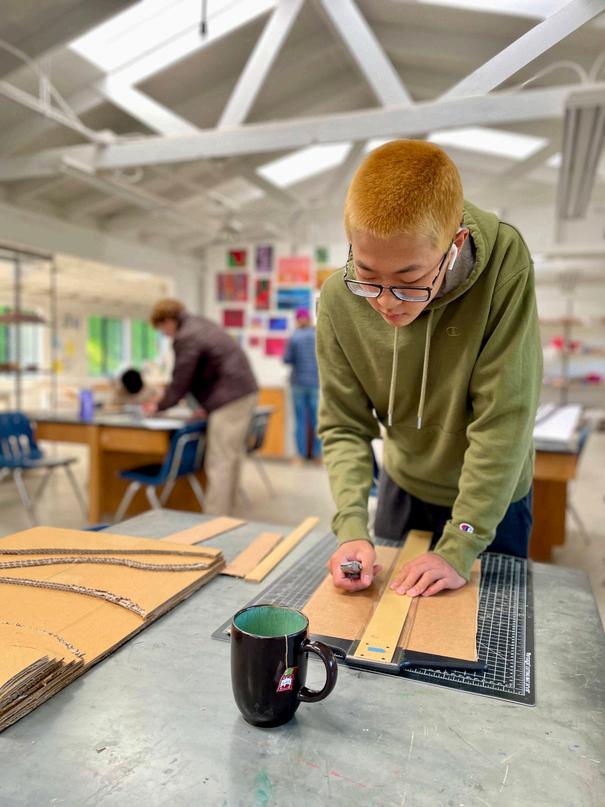


Midland is neither a therapeutic nor remedial school. With a small teacher-to-student ratio and a residential community, teachers are accessible to students, but students need to be proactive about accessing extra support when needed. Students have access to a variety of structured academic supports, including weekly teacher office hours during a designated Academic Support Block, triweekly proctored additional afternoon study hall, and an Academic Support faculty who is available to meet individually with students to come up with strategies for time management and studying.
This faculty, who does not serve students as a private or subject-specific tutor, also coordinates our peer tutoring program, where students self-select to be tutored or serve as a tutor, often setting up weekly times to connect and work through challenges. Occasionally families will hire an independent outside tutor to work with their student on a particular subject, but these sessions must occur during students’ limited free time and be coordinated via our Academic Support faculty.
Any student who has a C- or below at an official grade report, will be flagged for concern. They will have follow up meetings with their advisor, teacher, Academic Dean and/or Academic Support faculty to strategize a path towards remediation, as any graduation-requirement course must be passed with at least a C- to advance at Midland.

The integrity of Midland’s academic program rests on full in-person participation from all students. As a place-based, experiential and college-prep institution, our learning happens across our campus in this residential learning community; we do not offer remote learning. That said, we recognize that from time to time a student must miss school for health reasons. When this happens, the responsibility rests with the student to communicate with their teachers and peers to stay current with materials and homework posted on MyMidland and Google Classroom, and to proactively reach out via email when they are confused.
The limit to student leave from campus is two weeks or less, as we have found that beyond this it becomes difficult to impossible for a student to self-teach themselves all they are missing in class. Once a student has missed more than two weeks, their eligibility for receiving academic credit is in question, as we cannot uphold the integrity of our academic program and award distance credit after too many school hours are missed.
We do not teach to standardized tests like the SAT or ACT in Midland curriculum. While we recognize that the results of these tests can be nominally useful to students in college applications, with so many schools going test optional, we believe that devoting primary energy towards supporting students in success across their academic core Midland classes is more important.
That said, we do offer the following tests at Midland on specific dates as listed below:
Once a year in the Fall Semester for Grade 11 students
SAT
Once a year in the Fall Semester for Grade 12 students
Once a year in the Spring Semester for Grade 11 students
Once a year in the Fall Semester
ACT
Once a year in the Spring Semester
If students are interested in taking more tests or testing at other dates, they are encouraged to do so over their school holiday breaks, otherwise they will need explicit permission in advance from the Dean of Students and Dean of Academics to miss Midland responsibilities including sports, jobs, classes and other activities. Even if approved, the school does not provide transportation for testing outside of the testing opportunities listed above.
Midland School has moved away from official College Board Advanced Placement (AP) classes. We believe in teaching essential skills that prepare students for life, not for a particular test. That said, as you will see within this Curriculum Guide, Midland has a number of classes that are University of California (UC)-approved honors courses.
As we do find that high-achieving students in honors-level courses sometimes score well on the equivalent AP tests, we offer the option for students to take AP tests at Midland if they fit the following criteria:
The student has completed the corresponding honors-level course successfully earning a B+ or above
The student has the subject teacher’s recommendation to take the corresponding AP exam
AP tests that we have offered on site at the Midland campus include:
AP Calculus AB or BC
AP Spanish Language and Composition
AP English Language and Composition
AP U.S. History
To take an AP test that does not have a comparable honors-level course at Midland, the student would need to meet one of the following criteria:
Native language with significant competency, for example AP Chinese Language
Completion of an AP-level course outside of Midland and can demonstrate high level of proficiency via a transcript or other assessment document
Midland does not encourage students to simply take tests because of nominal interest or even if they are studying on their own. We have found the results do not merit the high resource allocation for proctoring tests and in student time missed from core classes. Core class achievement continues to show as one of the most important factors for college admissions and readiness.



“Youaremorecapablethanyouthinkyouare,and Midlandwillhelpyoudiscoverthat.Youwillgainan immenseamountofself-knowledge andself-agency.”
ChristieTarman FormerAcademic&StudySkillsSupportFaculty

The Humanities Department encompasses English and Social Studies. Midland’s Humanities department houses our deepest connection to Diversity, Equity, Inclusion & Justice, as well as our domains of Critical Thinking & Analysis and Literacy & Voice.
Through the study of English, History, and Social Sciences, Midland’s humanities courses seek to develop students who have both the content knowledge foundation, and the core skills (research, close reading, analysis, written and verbal communication) necessary to interpret the world around them.
The Humanities program nurtures lifelong engagement in the work of meaning-making by decoding the products of human culture, and building connections between the past and present. Our curriculum is dedicated to diversifying the canon of authors and narratives that our students are exposed to, in hopes of providing opportunities for both “windows” into distinct perspectives, as well as “mirrors” for students’ own lived experiences.

"WhileEnglishclassesatMidlandhelp
buildcriticalthinkingandliteraryskills, theyalsoinspirestudentstograpplewith timelessquestionsaroundhuman existenceandexpression.
JohnIsaacson‘94
EnglishFaculty
In the context of Midland’s place-based curriculum, English 9 investigates the relationship between humankind and the natural world with special emphasis on constructing our identities as readers and writers. Students read literature of various genres – novels, poetry, drama, and non-fiction – in an effort to expand their exposure to identities both similar (“mirrors”) and different from (“windows”) their own, while learning critical reading skills and analytical terminology. Writing assignments include essays, poems, letters, newspaper articles, book reviews, speeches, journal reflections, interviews, and a research paper. Grammar instruction and vocabulary development parallel expectations for essential reading and writing skills.
Works of literature are chosen to complement the themes explored in the World History course. Students read creation stories, epic poems, Greek drama, fiction, graphic novel memoirs, and poetry by both Western and non-Western authors set in a wide variety of historical time periods and places including the Middle East, Ancient Greece, and Africa. Students continue to develop critical reading, writing, and discussion skills, while widening their knowledge of vocabulary and complex grammar. Assignments include creation stories, comparative essays, historical retellings, analytical essays, creative writing, and comic memoirs with special emphasis on developing an argument based on a thesis supported by evidence.
Dovetailing with the American Studies: History course, students explore dominant and counter narratives throughout American history in this literature course. Over the course of each unit, students read short stories, plays, novels, poetry, and essays that explore and define the American experience. In addition to building critical close-reading and analytical strategies, students develop their communication skills in a variety of ways. Students hone their verbal and nonverbal presentation skills through personal speeches and projects. We utilize the Harkness method for class discussions, in which students drive the conversation for and with their peers through clarifying and complicating questions, direct citation of textual evidence, building off each other's ideas, and finding textual connections. Students practice a wide variety of writing styles as well, including personal essays, observational narratives and vignettes, and analytical pieces. Students work to improve their writing skills through multiple revisions, in accordance with peer and instructor feedback. of a support supported,
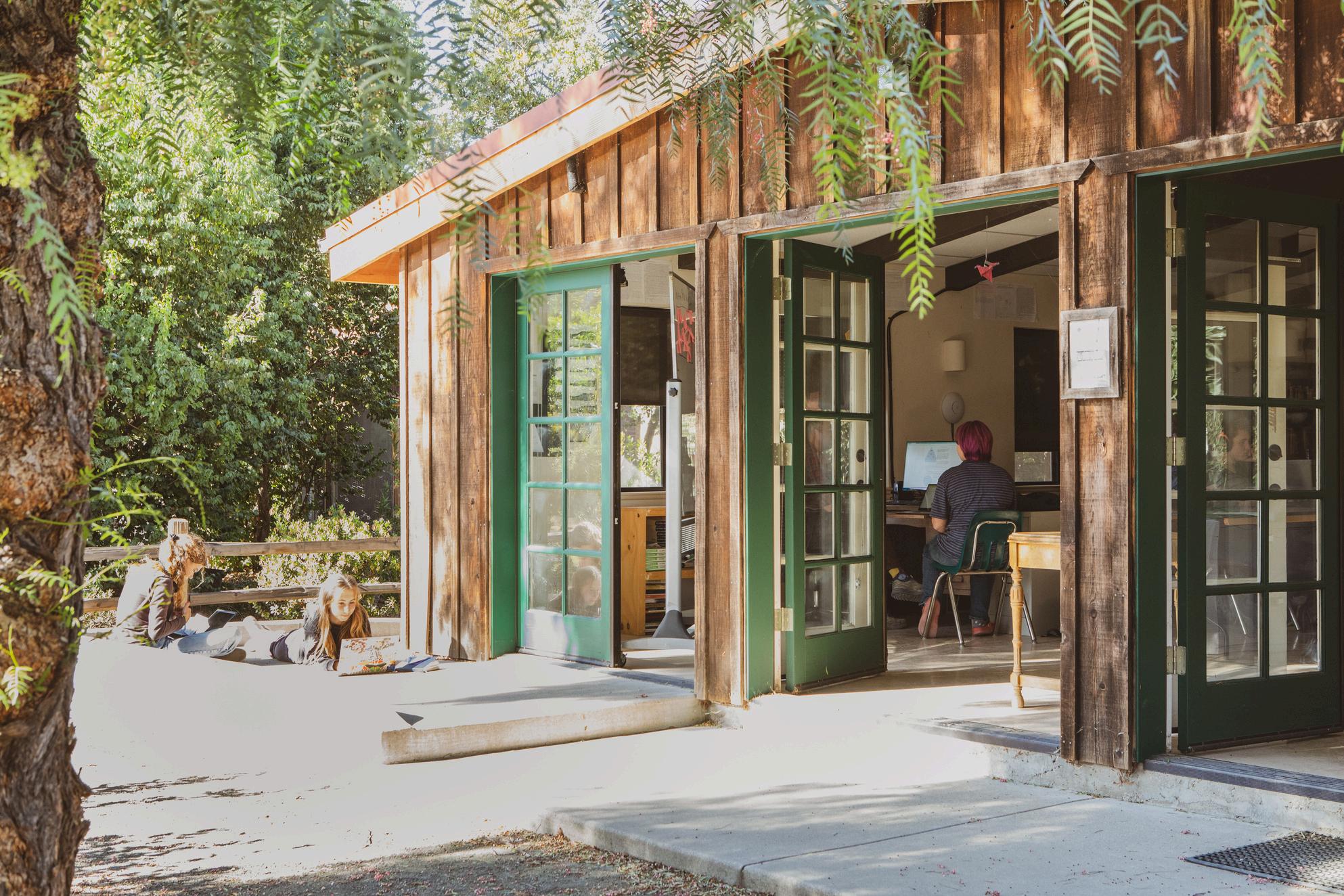
How do young thinkers explore, establish, evaluate, and express a burgeoning worldview in an unstable and ever-shifting world? In the culminating year of English at Midland, English 12 builds college readiness by bolstering technical writing skills, and by strengthening students’ emotional and intellectual engagement with relevant texts. Story, Self & Society seeks to reinvigorate and reframe the concept of the ‘essay’—to engage with their essay not as a noun to be produced or a form to be mimicked, but in its verb sense (“to try, attempt, or undertake”). English 12 students read, analyze, and respond to an eclectic pantheon of classic and contemporary authors and forms. After beginning the year with short stories from a diversity of writers, including George Saunders, Ted Chiang, Lydia Davis, and Anton Chekhov, students begin a twelve-week exploration of Ralph Ellison's Invisible Man, with Jean-Paul Sartre and Dostoyevsky. A poetry analysis and composition unit, and a reflective reading of Rainer Maria Rilke's Letters to a Young Poet round out the final third of the year. English 12 seeks to reinforce writing as exploratory, intrinsic, immediate, elastic, relevant, and alive.
A faster reading pace and slightly heavier reading load exposes Honors students to a greater breadth of texts; successful Honors students are able self-starters with grit, strong executive functioning skills, and a love of reading and writing. With more personalized writing instruction and additional in-class reading time, regular English 12 students benefit from greater scaffolding in order to bolster college readiness.
“Midland'shumanitiescoursescultivate studentstobecuriouslearnerswhocan interpret,interact,andcriticallyengage withthehumanconditioninorderto makesenseoftheworld.”
StevenHu HumanitiesFaculty
Midland’s iconic place-based 9th Grade social science course employs an anthropological approach that explores how land and resources shape – and are shaped by – people. Our overarching goal is to understand and appreciate the history and legacies of the distinct peoples that have moved through and settled in our region in the Santa Ynez Valley. We take an in-depth look at the Chumash (the original inhabitants of the region), exploring ways in which the Chumash used, managed, and cultivated local resources, and how they were impacted by the Spanish, Mexican, and American incursions in this land. Students then explore the legacy of these different cultures in the Santa Ynez Valley today. This includes examining the history and culture of Midland School and our use of local and agricultural resources. The course employs several modalities for learning, including traditional classroom lecture and discussion, local field trips, and the exploration of environmental literature as a means to reflect on how students, as individuals, relate to their landscapes.
The 9th grade California History class builds on their foundational history of this region from Midland 101 and brings students into the modern era. While students will learn about the major economic, social and political forces that drove the development of California from 1850 to the middle of the 20th Century, the class will also be working on a variety of skills that will serve their academic experience in the 9th grade year and beyond. The course begins with an examination of the War with Mexico and the acquisition of California by the United States. Students then explore the rapid and chaotic economic and social development, characterized by intense oppression of persons of color, accelerated by the Gold Rush in 1849. Students proceed to examine a variety of topics including but not limited to, the experience of the Central Pacific Railroad and the exploitation of Chinese labor, the development of Southern California and the oppression of Native Peoples. Students will also study the history of the environmental changes in the state including the challenges posed by a limited water supply, a growing population and the political and economic dominance of white, male industrialists. The students also look at the impact of World War 2 on the state’s development and the shameful treatment of Japanese Americans and its dark legacy. The course concludes with a look at the experiences of Dolores Huerta, Cesar Chavez and the development of the United Farm Workers. In parallel with the study of content, special attention will be directed to developing the skills of primary source analysis, and wielding effective evidence in service of historical claims.
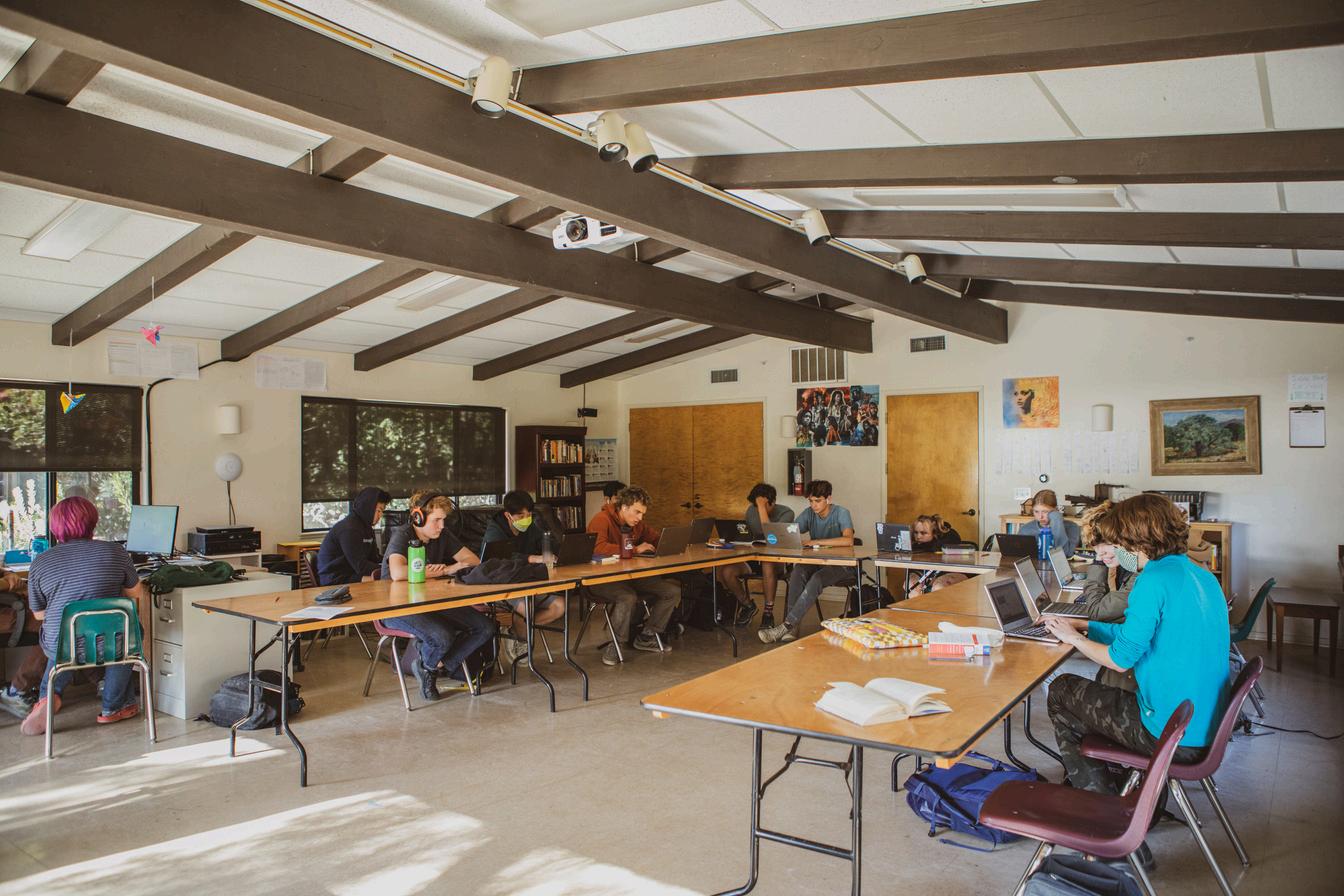


World History is organized both chronologically and thematically, encouraging the development of critical and historical thinking skills. The first semester explores world religions, agriculture, and early government through the development of complex human societies. During the second semester, students delve into the modern era through the themes of Empire, Exploration, Conquest, Colonization, War, and Peace. Students explore topics of Diversity, Equity, Inclusion and Justice as they pertain to World History such as caste in Hinduism, patriarchy in ancient Greece and Rome, and racism in colonization, among other topics. Each unit requires students to evaluate and synthesize historical sources and modern analysis, to question and corroborate evidence, to think critically and draw conclusions, and to apply their historical knowledge to contemporary and ethical issues, creating connections to students’ lives. The curriculum is thematically coordinated with the World Literature course.
Through this course, students will not only gain a foundational knowledge of U.S. History, but they will also develop core social science skills that enable them to interpret the world around them. To achieve this end, the major units are organized both chronologically and thematically. Units include explorations of America’s first peoples, founding ideas and principles, structural inequalities and the fight for equal rights, and an extensive research project exploring topics of student interest. Advancing their historical thinking skills, students discuss issues, analyze secondary and primary source documents, write argumentative and creative papers, conduct research projects, and present their findings to peers.
The honors course involves a reading load that is closer to the college level (both in complexity of content and in reading load). The Honors option is for the committed student who has shown a high level of proficiency in source analysis, and is ready to push their social science writing skills to the next level. Recommendation from prior social science teacher is required.

Note: Electives offerings can change each year depending on interest and staffing.
Religion and Popular Culture examines the influence of religion in the modern world. Through an exploration of “religion” and “popular culture” as critical concepts, students explore phenomena such as hip hop, yoga, Taylor Swift, and TikTok to unearth how faith and spirituality show up in and intersect with the popular. This course will also analyze other important issues such as religious nationalism, religious environmentalism, and religious peace-making to glimpse possible futures religion might offer for our world’s most vexing problems. In understanding the intersection between religion and popular culture, students will appreciate why and how the sacred continues to impact people’s lives in the modern world.
The goal of the Geopolitics course is to provide students with a historical understanding of the scale and complexity of challenges that the world faces today and will face throughout the 21st century, as well as the diversity of approaches that will be necessary to address these challenges. Students will examine the historical context that created the issues, including the 7th century origins of the Sunni-Shia schism, the establishment of intergovernmental organizations such as the United

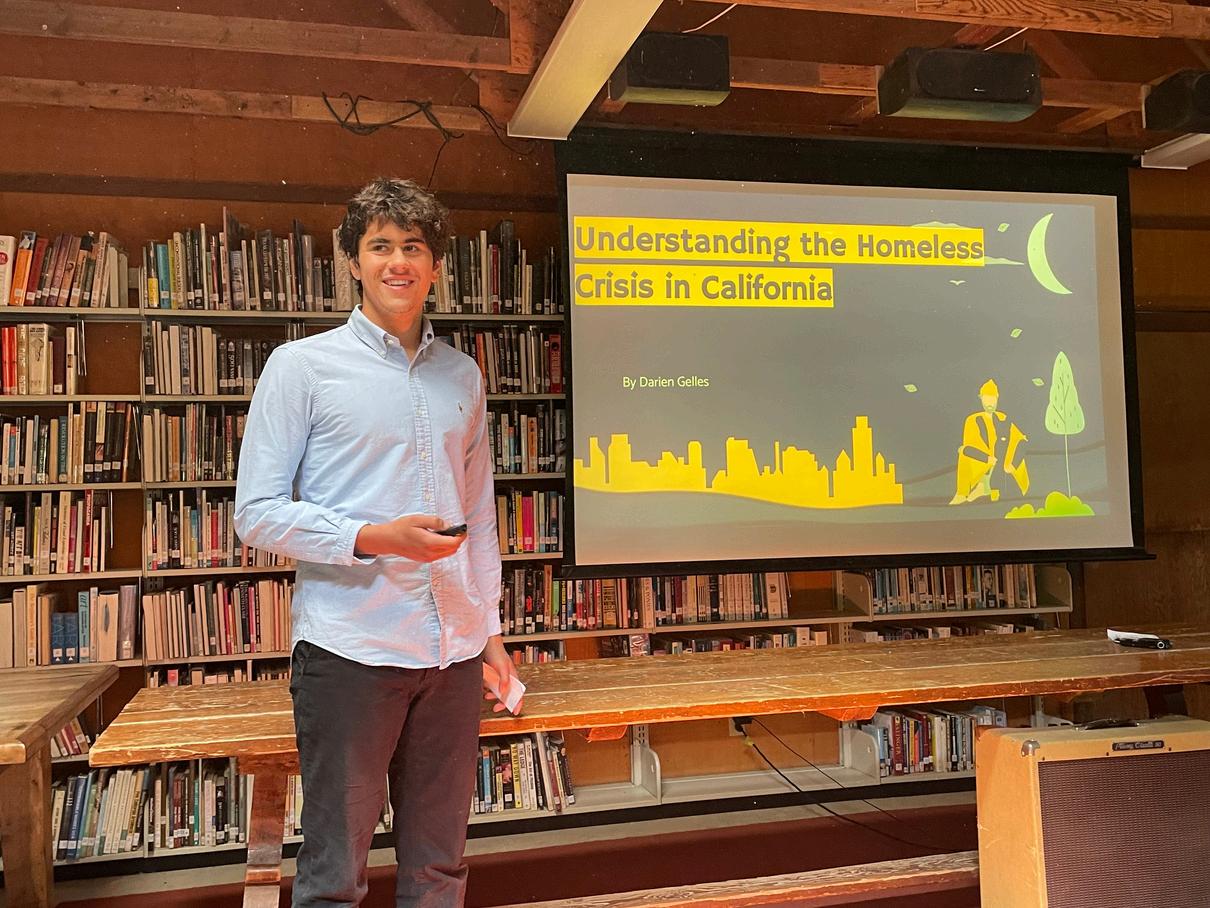



All Midland seniors complete a Senior Thesis (or Senior Project) as a graduation requirement. This work is the academic culmination of a Midland education, embodying values of self-reliance, personal responsibility, and information literacy. It is an opportunity for seniors to explore a topic of their choice, prepare a thesis paper, and present their work in a talk to the entire school community in the Senior Symposium. Senior Thesis showcases students' intellectual curiosity through research, critical analysis, and the communication of their topics.
The Midland Senior Project is an opportunity for seniors to truly live their education. In this class students develop an independent project with multidimensional learning goals in an area of their own interest. It is a semester-long endeavor that requires planning, time management, research, craftsmanship, problem solving, and student agency. Past projects have included everything from designing and building an electric car, constructing a mile-long trail on the property, making perfumes from local plants, a hands-on investigation on the sustainability of eating, and so much more!
The Mathematics Department courses focus on the domains of Critical Thinking & Analysis, Problem Solving, and Literacy & Voice.
Our core courses are sequentially linked, requiring the mastery and assimilation of skills as students advance through our curriculum. While we practice the application of mathematical skills to our daily lives, we also cultivate the important habits of mental discipline and organization in order to structure our minds for rigor.

"AtMidland,weoftentake Mathematicsoutsidetheclassroom forreal-lifeapplications."
NhiNguyen MathematicsFaculty

This course is our gateway to higher mathematics, laying the foundation for all other courses to follow. Beginning with describing what numbers mean and the language of mathematics, we journey into solving equations. We then begin working with exponents and radicals; building, graphing, and solving linear equations and systems, followed by learning functional notation and the language of functions. The course ends with factoring and solving quadratics, as well as translating numbers at Midland’s farm and ranch programs into mathematical expressions and equations.
The foundation of this Algebra 2 course lies in studying some of the most common functions and analyzing them both graphically and algebraically. This includes absolute value, quadratic, higher order polynomials such as cubics, radical and rational functions, exponential and logarithmic. Vocabulary and notation are learned and developed so that students can coherently analyze and write about them. General algebraic techniques and concepts such as factoring, inverses, and composition are applied to each function, and solving equations using multiple methods are emphasized. The real number system is explored including an introduction to irrational and complex numbers. Trigonometric relationships are further explored to show how they can be used to define a point in space, thus leading to the graphs of basic trig functions. Precision is emphasized.
In the honors course, students dive deeper into advanced problem solving techniques for each function as well as their limitations to describe the real world. Students also explore independent topics of the number system and other algebraic proofs and derivations. Instructor approval is required to enroll in the honors section.
This course guides students to logically develop the structure of Euclidean geometry and apply the resulting definitions, theorems, proofs, and formulas to meaningful problems. We use experimentation, inductive reasoning, and tools including compass and straightedge to construct geometric concepts, discover geometric relationships, and formulate conjectures. Students employ deductive logic to construct formal logical arguments and proofs. Students apply mathematical skills and organizational techniques to make connections to life’s experiences.

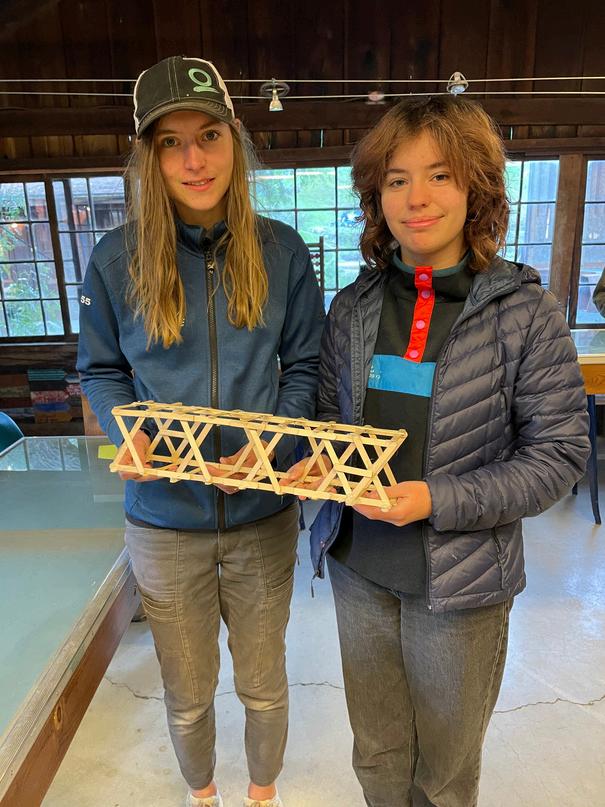
This course is designed to acquaint students with the theory and practice of statistics, with a primary emphasis on conceptual literacy over calculation. Students explore how data is produced, organized, and presented as well as basic probability theory and how to draw inferences about a population from a sample. At the end of the course, students are better able to appreciate the omnipresent nature of statistics in our world, and more importantly, to evaluate statistical claims. Understanding how statistics are used and misused is an essential skill for students wishing to pursue careers in science or social science, or simply to become informed citizens.
This class is intended to prepare students for Calculus, the mathematics of functions and change. Using the language of functions, we more deeply analyze concepts familiar from Algebra 2 including polynomials, exponentials, logarithms, and trigonometry, and explore their use as mathematical models.
While regular Precalculus will prepare students for Calculus 1, the Honors section includes additional topics including vectors, matrices, series, and parametric functions which prepare students for Calculus 2 and more advanced mathematical study.
Calculus arose from an attempt to develop mathematical techniques that could more aptly describe and predict a physical world filled with constant change. The course emphasizes a multirepresentational approach to calculus, with concepts, results, and problems being expressed graphically, numerically, analytically, and verbally. It is designed to develop students’ knowledge and understanding of the concepts of calculus by providing a strong foundation of basic skills as well as diverse applications of its methods.
Calculus 1 Honors includes additional college level topics and is highly recommended for students who intend to continue with more advanced courses in mathematics. Students in Calculus 1 Honors have the option of taking the AP Calculus AB exam at the end of the year.

This course is designed to strengthen students’ understanding of calculus with advanced calculus problem-solving skills. Students learn new integration techniques, as well as applying calculus to parametric and polar functions. Students develop a better understanding of limits, and study both sequences and series, which make up the theoretical foundations of modern calculus. Students in Calculus 2 prepare for the AP Calculus BC exam at the end of the year through example problems and practice exams.
*Depending on enrollment, this class may be offered as an independent study.
This course builds on Calculus 1 Honors and Calculus 2 by taking the concepts of differentiation and integration and applying them to functions of several variables. Using the language of vectors and vector-valued functions, we define and explore partial derivatives, line-integrals, and multivariable integrals. Vector calculus is essential to advanced studies in engineering, physics, and pure mathematics, and has applications in biology and computer science.
*Depending on enrollment, this class may be offered as an independent study.
Rooted in hands-on, experiential learning and utilizing our incredible land resource, Midland’s Science Department trains students as naturalists, geologists, chemists, biologists, and most importantly, citizens who understand science and how it can be used to address some of the world’s biggest problems.
Through training in each discipline students gain fluency in the process of scientific inquiry by learning to make rigorous observations, ask questions, design and carry out experiments, and evaluate their results in the context of the world around them. Focusing on Midland’s Portrait domains of Connection to Place & Environment and Critical Thinking & Analysis, students learn not just to be better observers, fluent in the landscapes surrounding the Midland School, but they learn transferable skills which help them leave the world better than they found it, no matter where they call home.

"Utilizingthenaturalworldasa classroom,thescienceprogram supportsMidland’smissionofselfreliance,responsibilitytocommunity andenvironment,andloveofthe outdoors.”
DanSusman DeanofExperientialLearning
Midland’s iconic place-based 9th grade science science class focuses on getting to know our 2,860 acres – contiguous with one of the largest undeveloped and unfragmented habitats in the mountains and foothills of Southern California – through the lenses of earth science and ecology. We are principally concerned with developing skills and habits to explore and study the land as naturalists, using direct experience and observation on guided walks, in field journaling exercises, and with a variety of mapping tools. Drawing on both on western science and traditional ecological knowledge accumulated for generations by the local Chumash people, students learn about the topography, underlying geology, agricultural systems, trees, wildflowers, birds, and climate of the Midland property and Santa Barbara region, while also developing the skill of getting to know a place and understand natural resources wherever they go.
This course is rooted in the inquiry and application of chemistry concepts to the real world. Each unit students will build their science skills in a variety of areas including planning investigations, using models, applying math, analyzing data, as well as using evidence and reasoning to communicate conclusions. Students will participate in hands-on labs, readings, and discussions that will span various chemistry concepts including thermodynamics, properties of matter, atomic-scale interactions, chemical reactions, and nuclear chemistry. Students will leave this class with transferrable science skills and a deeper understanding of how chemistry influences the world around them.
This course introduces students to the scientific study of life. The class is rooted in the inquiry and application of biology concepts in the real world. Each unit students will build their science skills in a variety of areas including planning investigations, using models, analyzing data, as well as using evidence and reasoning to communicate conclusions. Students will participate in hands-on labs, readings, and discussions that will span various biology concepts including ecosystems, matter & energy cycles, genetics, evolution, and speciation. Students will leave this class with transferrable science skills and a deeper knowledge of the human body as well as the diversity of life on Earth.
Honors Biology coursework is rigorous and includes more intensive investigation of the core skills and concepts at a faster pace. Students complete additional readings, homework, and labs, which allow us to go a step further in depth and detail.

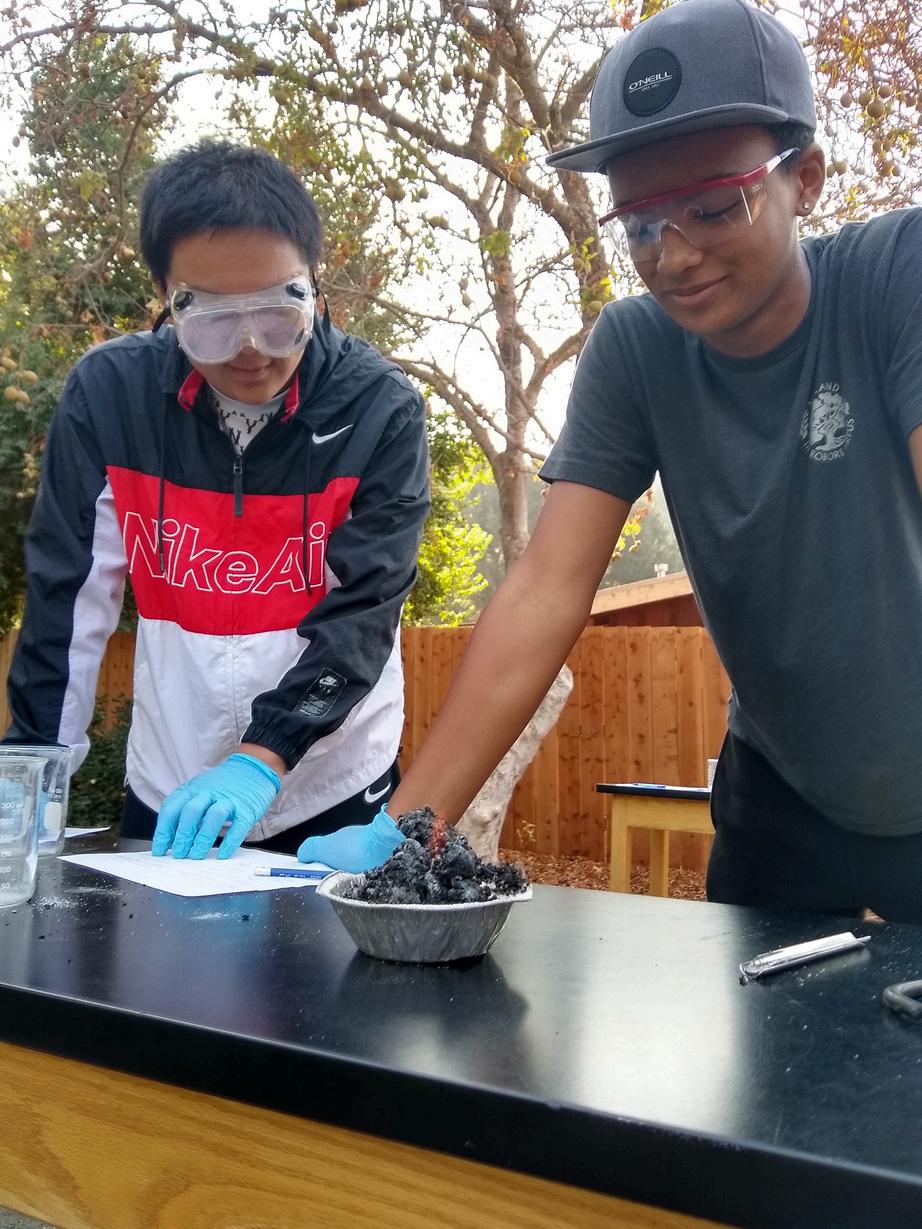
Note: Electives offerings can change each year depending on interest and staffing.
This course will engage students in learning about real-world environmental issues in both local and global contexts. To start the year, we will discuss environmental value systems and how the environment is viewed and valued across different cultures. Using an inquiry-based approach, students will compare the efficacy of individual and collective sustainability practices. We will develop our experimentation, data collection, and analysis skills as we study interactions between Earth Systems in the land surrounding Midland's campus. These skills will help us determine the impact of local development projects. Using the ocean as our focus, we will study complex environmental issues and practice applying science to decision-making that must balance the needs of the environment with the many needs of humans. Lastly, we will research and develop evidencebased argumentation as we debate climate change policy decisions. We will study how multiple disciplines: science, law and policy, business, and story-telling can work together to support progress on climate action. This class will have a strong emphasis on using science as a starting point for local and global change.
The honors section of this class involves completing more rigorous readings and discussion, as well as the undertaking of an independent experimental research project that will be presented at the end of the year. The Honors option is for committed students who have shown a high level of scholarship and interest in previous science courses.
Field Ecology is a semester-long, college-level science course which affords ample opportunity to explore the terrestrial and freshwater ecosystems on the Midland property. In this class students are trained as field biologists in fundamental ecological concepts, experimental design, data collection, statistical analysis, and scientific writing. The course culminates in students designing and carrying out an original independent field study, including a write-up of their findings as a scientific journal article and a presentation of their research to a panel of scientists. Topics of study vary each semester, but in the past have included aquatic invertebrate sampling to assess the health of local streams, monitoring of our endangered Santa Barbara Jewelflower population, and studies of the effects of cattle grazing on various plant species.
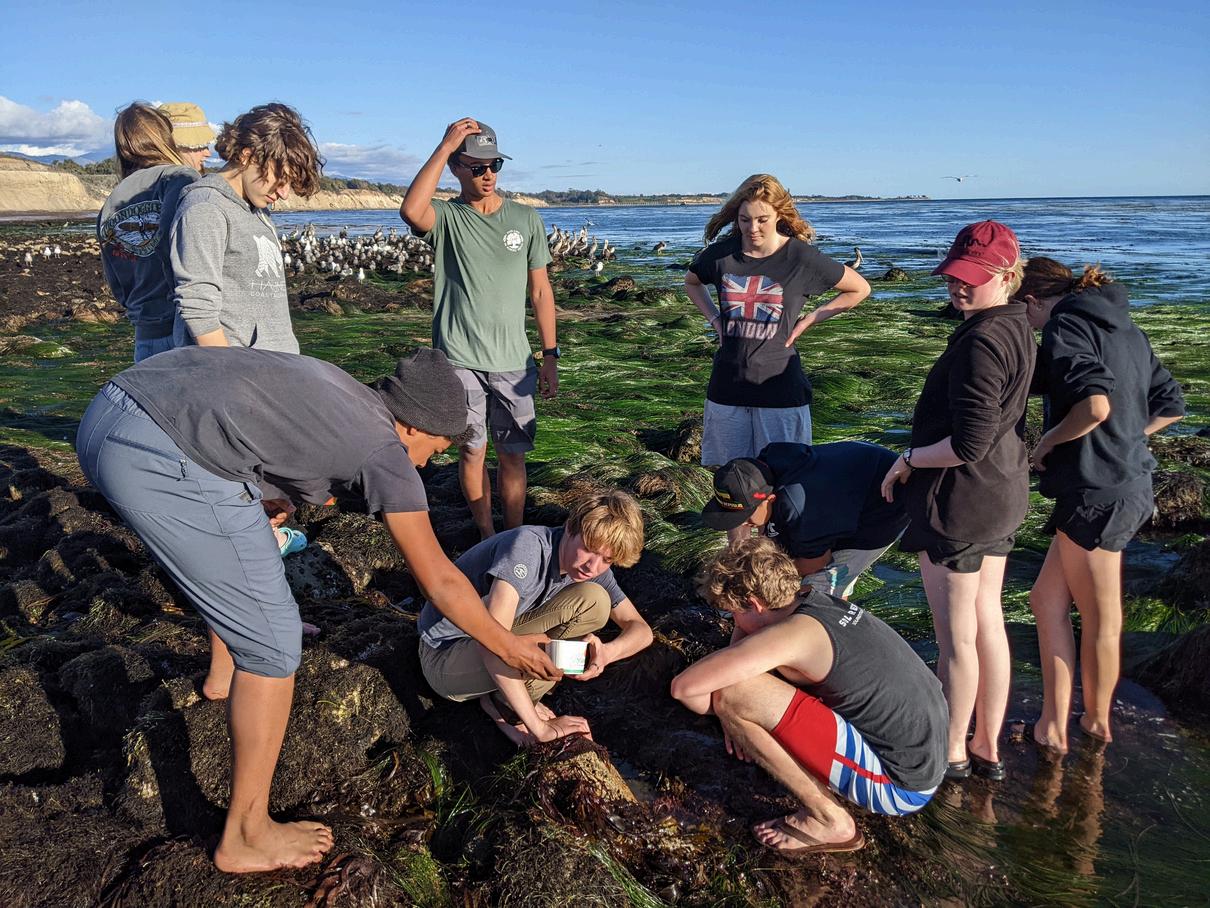
In this course, students learn traditional fundamentals of physics through laboratory experimentation and projects involving self-discovery of physics concepts. Formal physics lectures covering concepts and equations are augmented by demonstrations and labs that provide a handson approach to understanding the concepts beyond the merely conceptual level. In addition, Physics provides students with practical skills and knowledge to show how it fits in our everyday world.
This course will provide students with an introduction to earth's physical structure, substance, history, and the processes that act upon it. By utilizing the amazing geology found on the Midland property a field studies component will set the bedrock for the course’s curriculum. Students will get an understanding of the geology that shaped the local region and western North America.
Marine Biology introduces students to the ocean and its inhabitants with a field studies component that takes advantage of Midland’s proximity to the Pacific Coast. Through readings, discussion, laboratory exercises, examination of live material (often aided by microscopes), field trips to a rich variety of ecosystems (sandy beaches, rocky intertidal, mudflats), student research projects, and lectures by experts at UC Santa Barbara, students explore oceanography, invertebrate and vertebrate zoology, ecology, and human-ocean issues.
Rooted in the Portrait domains of Literacy & Voice, Critical Thinking & Analysis, and Diversity, Equity, Inclusion & Justice, the Spanish Department develops language proficiency as well as historical and cultural knowledge about the Spanishspeaking world. Our courses are sequentially linked, emphasizing the assimilation of increasingly complex grammatical structures and vocabulary, paired with rising awareness and appreciation of the social worlds of Latin America and Spain, and of Spanish-speakers in the United States. Classes are taught primarily in Spanish by teachers who bring their own experiences in the Spanish-speaking world into the classroom.
In keeping with our place-based education, Spanish is the only language taught at Midland. Our property was originally part of a Mexican land grant, and Spanish was spoken in the area long before English. Our graduates leave Midland with a strong sense of their surroundings and of the importance of Spanish in California, past and present, where more than one-third of the current population speaks Spanish.

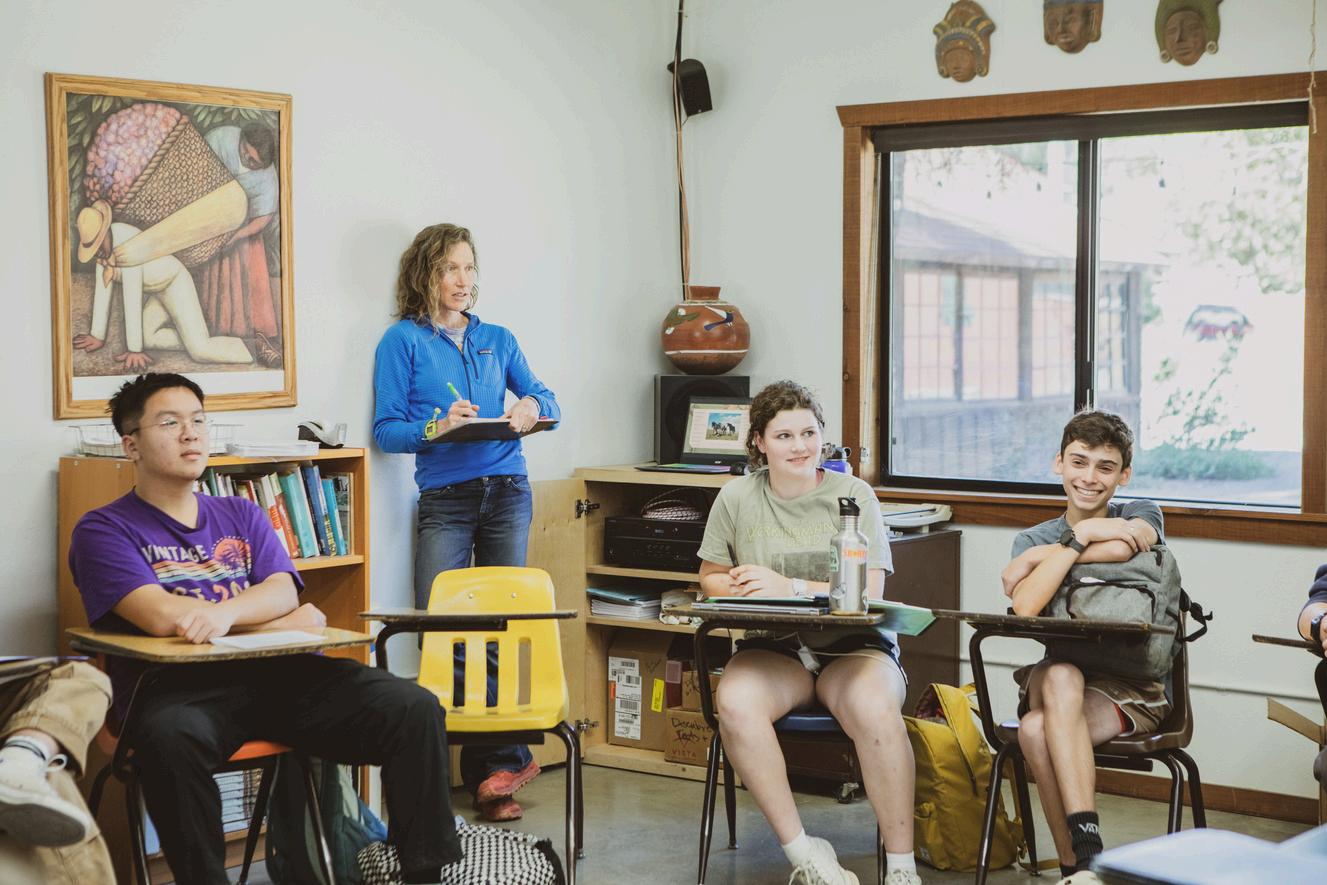
“TheSpanishdepartmentdoesnot solelyteachlanguage;itcenterson learningaboutandappreciatingthe diversityinSpanish-speakingcultures andcountries.”
JoséJuanIbarra‘87 DeanofStudents&AthleticsDirector
The first-year language course introduces students to the four basic language skills: listening comprehension, speaking, reading, and writing skills, within a cultural context in the Spanishspeaking world. Students learn introductory vocabulary and grammar to speak about themselves, greetings, classroom and school life, family, pastimes, travels and vacations, and likes and dislikes. This class introduces the present tense, commands, numbers, gender of nouns and adjectives, object pronouns, reflexive verbs, the gerund, and the preterit. Cultural elements representative of the Spanish-speaking world are incorporated throughout the curriculum.
In second-year Spanish, students continue their studies of the language and culture of the Spanishspeaking world. Through readings, conversations, music, and audio-visual resources, they develop their ability to interpret spoken and written language. Students increase production of the language through diary writing, classroom discussion and conversation, grammar exercises, poetry, and song. Spanish 2 is a grammar-heavy year covering the preterit, imperfect, and past and present perfect verb tenses, as well as the subjunctive and command forms. While the textbook presents windows into a variety of Spanish-speaking countries, this course additionally focuses on cultural topics such as Día de los Muertos, immigration, and Frida Kahlo through level-appropriate Spanish-language novels.
The third-year language course is designed to further develop students’ language skills and their knowledge of the culture and history of Latin America, Spain, and Spanish-speaking people in the United States. Building on the grammatical structures learned in Spanish 1 and 2, emphasis is given to developing students’ writing and speaking skills through a diversity of techniques, including written work, skits, and interactive activities. Students read, interpret, and analyze different texts, including short stories, poems, songs, and films. Students keep a journal, write essays based on original research, and give oral presentations to class. The main goal of the course is to attain proficiency in reading, writing, listening, and conversing in Spanish.
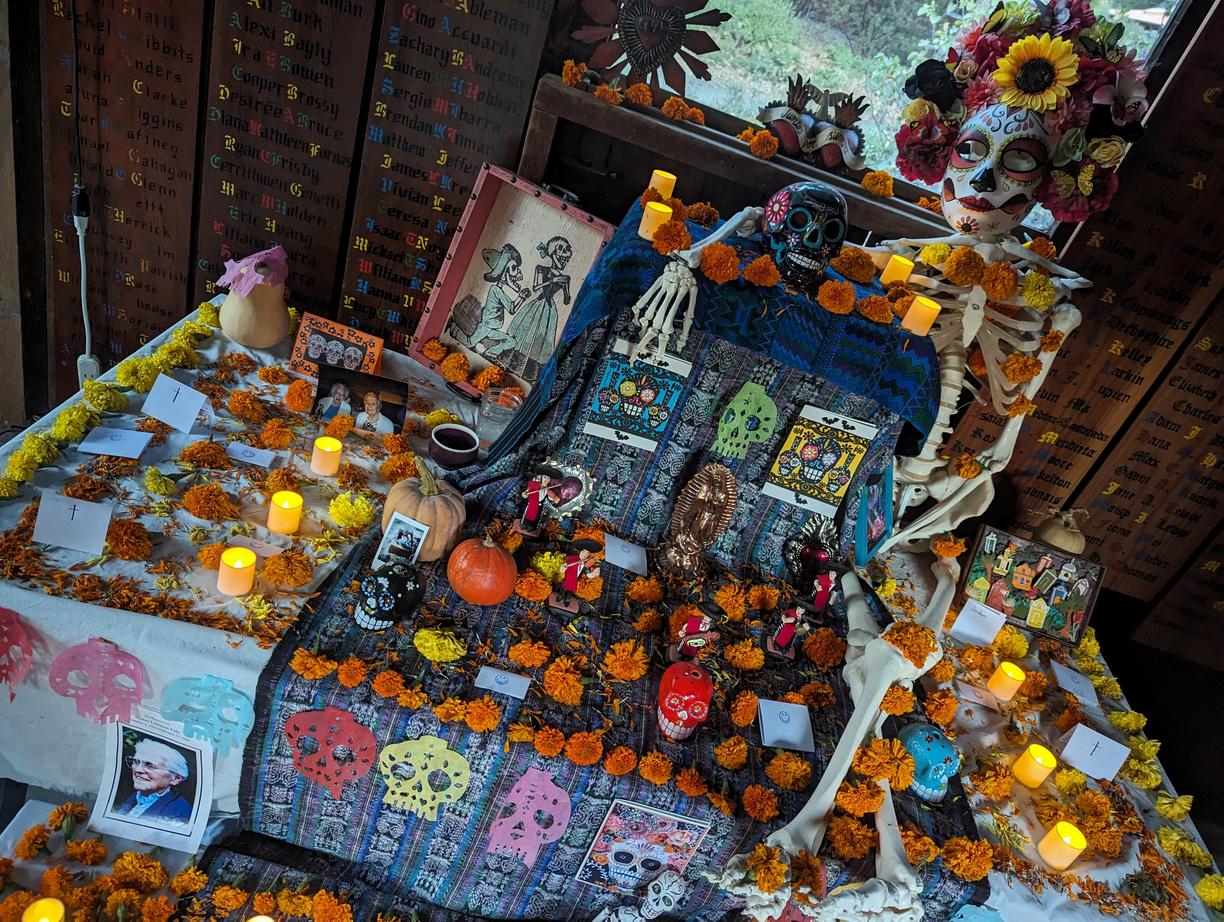
Note: Electives offerings can change each year depending on interest and staffing.
This advanced course further develops students’ language skills and ability to interpret visual, musical, and literary texts from the Spanish-speaking world. Students read and analyze short stories, plays, poems, novels, movies, and songs. They interpret, discuss, and write short and long essays on these different genres, gaining an understanding of the work of some of the most important authors from Latin America and Spain. At this level, students are expected to read critically and analytically, presenting nuanced interpretations in both their speaking and writing. Daily writing and speaking are essential to this course; students keep a journal and give oral presentations, thereby gaining further fluency in expressing their opinions and ideas in written and spoken Spanish.
Students in Spanish 4 Honors will be required to read more deeply and more widely in Spanish literature and to produce longer written assignments and oral presentations than non-honors students. In advancing their fluency, students will review complex texts that reflect Spanish language and grammar similar to that measured by the AP Spanish exam.
This advanced Spanish course is conversation-based, where students will explore the portrayal of the Latinx community in the United States in media including film, theater, television, press, the arts, and social media. This class is designed for students who have completed all of Midland’s sequential Spanish curriculum to continue honing their fluency in a small seminar-style course. Students will practice their verbal command of the language through discussing a variety of Spanish texts, media, and films, and through presentations to peers. Students will conduct their own research and write informal reflections and formal analyses of various sources, as well as creative pieces that provide opportunities to hone the vocabulary and grammatical skills built over years of Spanish study.
The Visual Arts Department cultivates active engagement between students and the natural and man-made world surrounding them. Students develop a way of observing the world, a language to describe it, and means for expressing it through the visual elements and principles of design. Through studio-based teaching strategies, portfolio-based assessment, and the use of Midland’s incredible property - which provides both physical resources and inspiration for student art - we develop the key artistic skills. The art classroom is an excellent place for students to develop in Midland’s Portrait of a Graduate domains Craftsmanship, Literacy & Voice, and Problem-Solving.

“Midland’svisualartdepartment
Foundations of Visual Art (1 credit) UC
stressesCraftsmanshipthroughthe useofnewmaterials,tools,and applications.Inspirationisdrawn fromnewtechnicalpracticesandthe worldaroundus.”
FaithNygren
This year-long course is designed to introduce students to beginning 2D and 3D art techniques and to build confidence in the ability to express themselves visually. The Foundations of Visual Art course teaches students the Elements of Art (line, shape, form, color, texture, shape, and value), which are the basic tools all artists use to create visual art. They also learn how to use those tools to create art that follows the Principles of Design (pattern, contrast, emphasis, balance, proportion/scale, harmony, and movement) and to create interesting and expressive pieces of art. The first semester of this course introduces a variety of art mediums and technical skills, including; contour line drawing, perspective drawing, wire sculpture, composition theory, aerial perspective, collage production, linoleum printmaking, and the construction of an insect sculpted out of dried natural materials. The second semester of this course introduces color theory, the grinding method, acrylic painting, architectural drawing, 3D architectural model construction, mixed media techniques, and large-scale art installation.
Note: Electives offerings can change each year depending on interest and staffing. Our art offerings typically rotate each year in order to maximize student opportunities to engage with new mediums and traditions of art.
Ceramics can be taken as a one-semester course or a year-long course. Students may not, however, begin the course during the second semester unless they have taken prior Ceramics at Midland. This course is an introduction to basic studio techniques and 3D design within the medium of ceramics. Upon completion of this course, students will be familiar with the methods and materials necessary for hand-building and use of the potter’s wheel. In addition to work in class, students are expected to complete assignments outside class. Studio work is supplemented with images of work from other ceramic artists, library research, and visiting artists.
Advanced Ceramics is for students who have completed a full year of regular Ceramics. Students expand upon the 3D design principles of volume and form, and they incorporate more personal themes into their work. Studio work consists of both sculptural and wheel work, and each student has choices in regard to personal preference. More challenging projects are introduced and more emphasis placed on aesthetics.


This class will give students an introduction to designing a woodshop, woodworking tools, and the building process. Discussions of different techniques and woodworking methods and projects will enable students to gain practical hands-on experience. Students will have the opportunity to identify and build surfcraft, furniture, and traditional brooms. They will also be able to pursue their own creative interests using their newly acquired skills. Much of the course will be dedicated to the use of traditional hand tools as well as shop tools such as the table saw, planer, miter saw, band saw, and drill press.
Advanced woodworking is offered as an option for a student that has taken an entire year of woodworking. This class will provide the opportunity to advance their skill set in a more independent learning environment, often with a deeper focus on a self-chosen body of work.


Design covers the basics of several different types of visual design, including graphic, fashion, product, architecture, and landscape design. We use the elements and principles of art and design, as we explore different ways of managing the components of these areas of visual work. We study how designers throughout history and current designers plan and execute their work. Each area involves a hands-on project using sketches and planning and ultimately the making of a piece of art or design to fulfill the assignments. Outside studio work and a sketchbook are required. Meetings, either in person or digitally, with established artists and designers are integrated in the course.
This yearlong course focuses on multi components of 2-dimensional art making. Students review the elements of art and principles of design as they create compositions in a variety of media, including graphite, charcoal, pen and ink, watercolor, acrylic paint and oil paint. Through technical projects, students learn to control a variety of mediums, strengthen their ability to understand color and texture, and translate their perception of a subject into a compelling composition. Lessons are supplemented with works from historical and contemporary art. Aesthetics and criticism are stressed through regular class critiques of artworks. Student ideas develop not only through the projects assigned – but through the practice of consistently recording personal observations in a sketchbook.
This year-long course is designed to provide the serious art student exposure to, and hands-on experience with, a variety of 2D and 3D techniques and media to further one’s personal artistic development. Students engage in exercises – such as perspective drawing – to strengthen general art skills. Basic design principles are reviewed and utilized to solve compositional problems. Studio work is supplemented with readings, images, and visits to local galleries and museums. Contemporary, historical, and philosophical issues within the art world are explored in depth. Attention is also given to developing a vocabulary for understanding and critiquing artwork. Outside studio work, reading assignments, and a sketchbook or journal are required. Utilization of Midland’s natural resources is an integral component of this course.

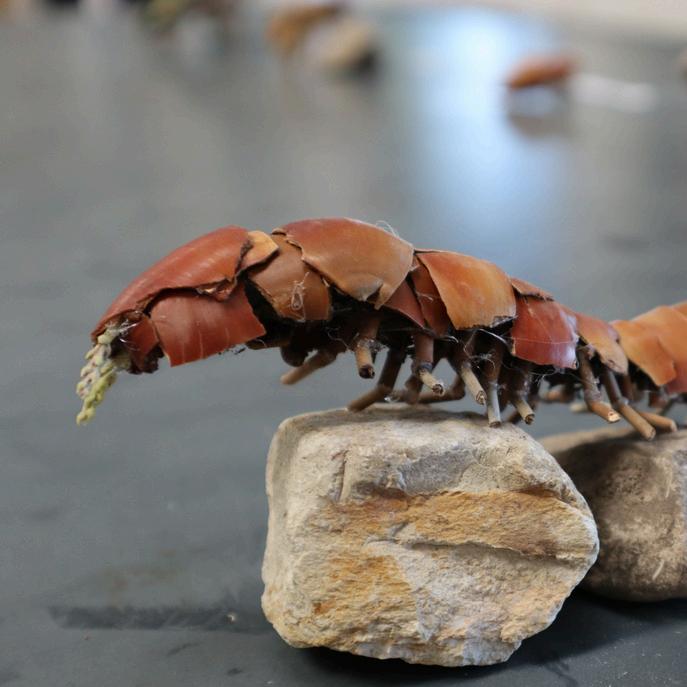

For nearly all of the school’s history we’ve known that meaningful work helps our students make meaning of their lives; this is one of the true gifts of a Midland education. At Midland, integrated experiential learning – learning by doing, seeing, leading, and experiencing – is a focused part of what we do every day.
Experiential learning embodies all of Midland’s mission and philosophy, particularly the following tenets, which take hold here and continue to develop throughout life:
A simple, self-reliant lifestyle, close to nature, teaches us to develop our inner resources, to distinguish between needs and wants, and to appreciate life’s fundamental joys and challenges.
A school community entrusting students with authentic leadership roles, emphasizing individual and collective responsibility, and relying on its own work to meet its basic needs, prepares students to take care of themselves and to serve others.
Connection to the environment, through academic education and everyday examples, teaches students to be good stewards of the earth.
A year-long course offered once weekly, the seminar equips students with tools and knowledge for self-care, self-advocacy, and self-management in social, emotional, physical and academic domains. New students are provided support and guidance as they explore their individual roles, responsibilities, and participation in the Midland community. Collaboratively taught by the Health Director and Academic Support faculty, this course prepares students to meet the challenges and opportunities they will face in High School and beyond. In addition to instruction in and practice of Midland specific strategies for time management, organization, and accessing academic support, students practice conflict resolution and problem solving. The health curriculum closely aligns with the National Sexual Education Standards and explores topics on sexual anatomy and physiology, reproductive health, adolescent development, mental health and wellness, nutrition, health advocacy, and self-care. Through experiential and team-building activities, students reflect on their unique learning styles and identities, share their perspectives, and set personal goals related to Midland Portrait of Graduate core competencies.
Being a senior is the ultimate test of leadership in a Midland student’s career. Whether heading a job crew, leading and mentoring younger students in the living yards, or applying to college, a senior is tasked with being a role model and liaison. While seeds of preparation are planted over years of observing and learning from one’s senior role models, formal training begins during the spring of junior year in a seminar course with all juniors, the Head of School, Dean of Students, and other faculty. The broad topics of leadership and followership are taught, discussed, and role played, with a focus on the roles and responsibilities of seniors at Midland, both ethically and practically. Students learn and practice explicit models of communication, feedback, and conflict resolution. Throughout this training and the transition into actual leadership roles as seniors, Midland students are immersed in authentic education for life, where their actions have meaning and consequence to others.
Offered during both semesters, this internship gives students the opportunity to engage with and contribute to our food system here at Midland, work on our 10-acre Real Organic Project Certified farm and practice the skills of leadership, teamwork, and problem solving while developing their work ethic. Students explore the science and art of agriculture though a curriculum that delves into soil science, agricultural history, social issues in agriculture, botany, and food systems exposing them to the many facets of how agriculture shapes our world. At the end of each semester, students research an area of agricultural interest for a final presentation that sheds light on topics ranging from the implications of international food systems to how to better the practices on our farm. Internship students also do the work of growing our food. They are involved in and vital to all aspects of production and leave internship with a basic set of agricultural skills and knowledge. They seed trays for the greenhouse, transplant starts into the fields, cultivate our row crops, harvest all varieties of our produce, prune and care for the fruit orchard, and learn the basics of operating our tractors. The aim is that students leave internship with a deep knowledge of this place and a new lens of where their food comes from, both within our local food system and the global food system.
NOTE: Participation in any semester of this course satisfies Midland’s farm graduation requirement.

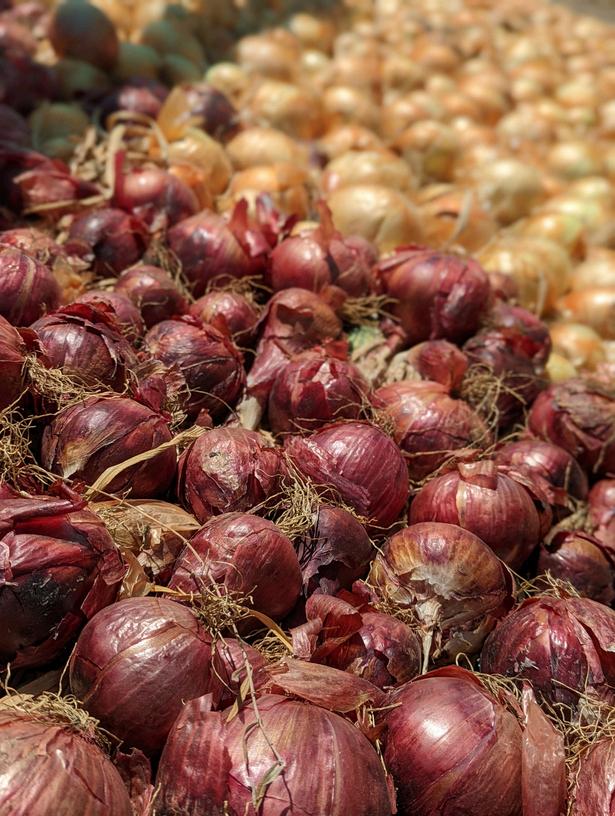


Offered both semesters, students in this course will take part in daily ranch duties - moving cattle, repairing fence, and maintaining pasture - with the Director of Rangeland Management and Conservation. Students focused on Horsemanship will learn the foundational skills to develop a horse using natural horsemanship methods. Each student is partnered with a project horse and is coached how to implement appropriate training strategies for that horse's further development in the school program while tracking progress throughout the process. Additionally, students will participate in a final trail course competition at the end of each semester to showcase their horse. Curriculum will explore concepts of holistic horse care, hoof trimming, horse/rider biomechanics, horse behavior, and communication without force. Students who focus on Ranch, will engage with our 2,860-acre historic ranch on horseback. Each student will learn how to utilize horsemanship skills in cow working and help raise our steers from weanlings in Midland’s “ranch to table” cattle program. Curriculum may explore holistic cattle grazing, cow work, roping, livestock rotation using horses, residual dry matter monitoring of pastures or visiting local ranches.
NOTE: Horse and Ranch Internship is a prerequisite for students’ eligibility for Horse Program leadership roles such as a student trail boss or student assistant instructor.
Most Saturday mornings, you will find Midland students engaging with our mission in an engaging way to promote Midland’s mission of a lifetime of learning. These designated blocks provide structure to do many of the types of activities that speak to Midland’s truest, most authentic self, but are hard to fit into the academic day; things like building, exploring, creating, investigating, and developing life skills. The range of activities include: hiking and overnight camping trips; musical, cultural, and educational presentations in Santa Barbara and the Santa Ynez Valley; artistic experiences including photography, design challenges, screen printing, sewing, and improv; gradelevel workshops in health, wellness, and sex education; experiences in the farm and kitchen; and time exploring our surroundings on horseback, with trail-building tools, or with binoculars. One of the hallmarks of Experiential Saturday is that they showcase community members’ passions, whether that is a student’s, faculty member’s, or alum.

With no tests or exams, Midland term (“MIDterm”) offers a pause for students and faculty to take a refreshing breath of spring, delve deeply into one of their interests, and connect with this place and one another before heading back home for break. These five days of experiential learning not only give a break from the Midland routine, but also give our students wonderful opportunities to explore topics that don’t fit neatly into our classes and to develop their proficiency in one or more of Midland’s seven core competencies. Some past offerings include:
Boarding School & Privilege: interview, act, & film a play on privilege in boarding schools
Bike, Hike, & Surf Adventure: bike and hike to/from Midland to the ocean, surf, & back
Midland Theater: write, produce and perform in an original, site-specific theater production exploring the past, present & future of Midland
Channel Island Exploration: camp, hike, kayak, snorkel & learn about the natural history of the Channel Islands
Trail building: student led offering building trail to connects Rain Gauge to the Reservoir Road
Yurt Construction: learn woodworking skills in constructing a 16-foot yurt for use for generations of Midlanders to come
Linoleum Printmaking Extravaganza: make linoleum printmaking blocks using carving tools & ink
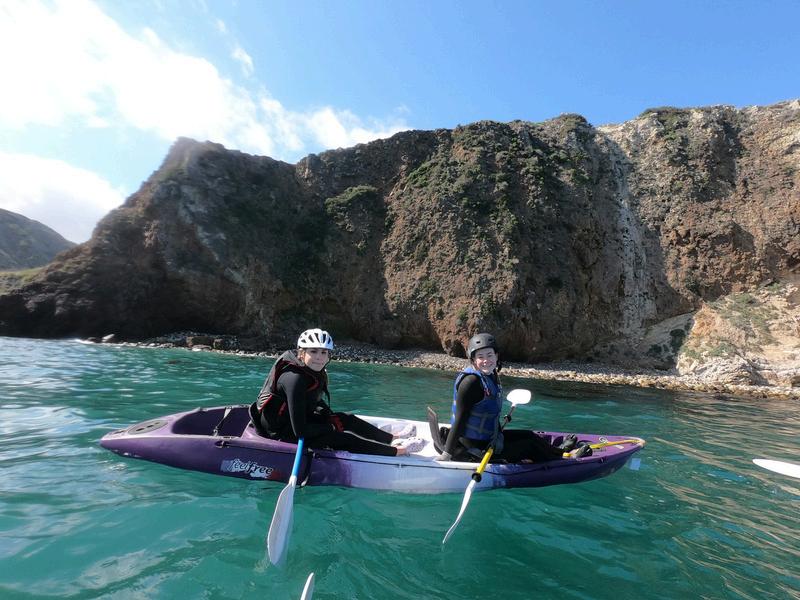
Guided Reflection in Nature: hiking, yoga, art, & reflection, culminating in a two night solo
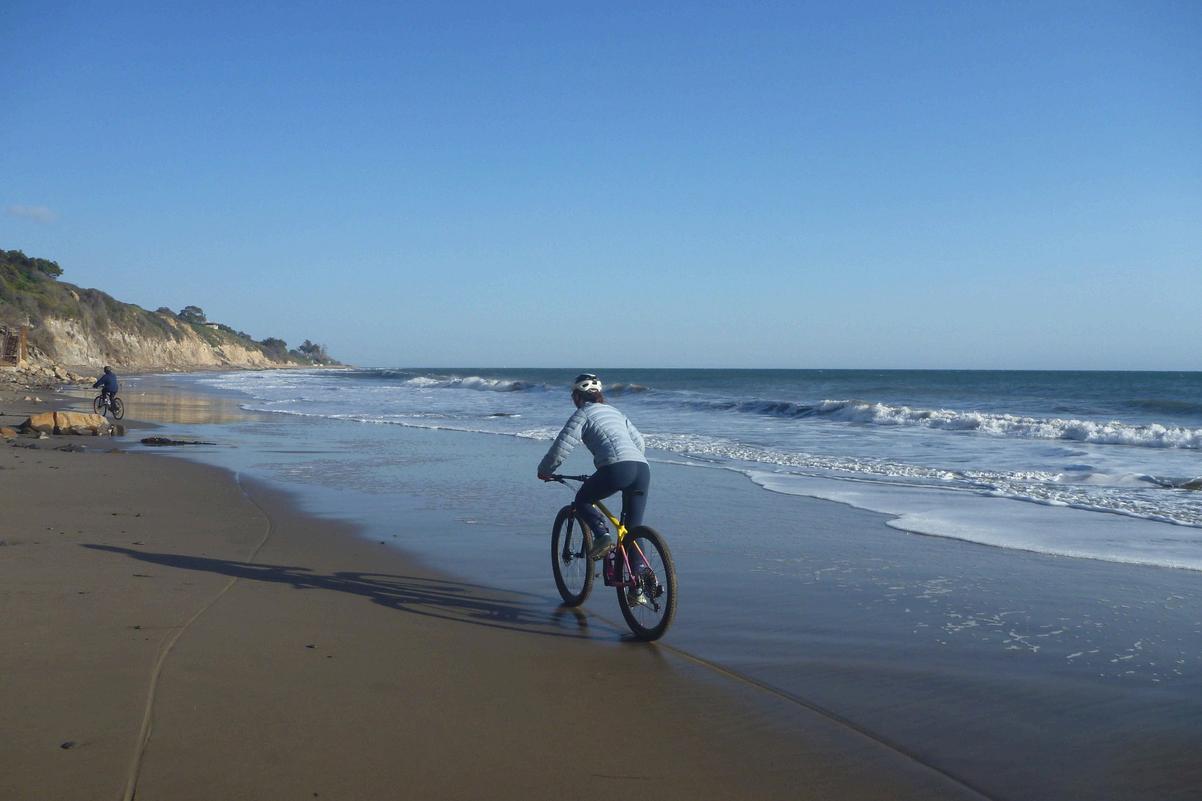
In the spring, all students participate in grade-level projects that are aligned with our core competencies. Experiential Week promotes class bonding, and acts as an annual rite of passage for each Midlander. An overview of offerings are below:
9th Graders take part in a backpacking experience in the local San Rafael Wilderness, camping at Midland’s 10-acre inholding property near the confluence of the Manzana and Sisquoc drainages. From this base camp, they explore the human and natural history of the area while practicing Leave No Trace wilderness ethics.
10th Graders get the campus to themselves and focus on campus restoration and building projects. In the recent past our sophomores have installed 3-kW solar photovoltaic arrays that collectively meet >40% of campus electricity needs and built additional campus infrastructure such as a pergola on the farm and outdoor shower fire infrastructure.
11th Graders work together by volunteering with Self-Help Enterprises to help build affordable housing in California’s Central Valley. This trip also serves as a cultural and language immersion program in a Spanish-speaking community in California.
12th Graders celebrate their final year of high school together by working on a legacy to leave for future Midlanders to come. One example of a recent project was processing reclaimed wood from demolished cabins to construct a beautiful wooden camping platform at the summit of a new student-built trail on campus.


A core part of the experience at Midland is learning to lead and building work ethic. At Midland, students are involved in running day-to-day operations, reviewing student disciplinary cases, planning whole-school events, and demonstrating the culture of the school for newcomers and visitors. It is through leadership opportunities that students can fully embrace all facets of the Portrait of Graduate, specifically, in the domain of “Being of Use,” to demonstrate integrity, initiative, and volunteerism.
To be a Midlander is to take that risk to solve problems creatively, to recognize the last 10% that needs to be done, and to step up in a way that shows commitment and care for the community.
The jobs program at Midland intentionally develops self-reliance, leadership, and responsibility in our students. Daily jobs contribute not only to the operations of the school, but to students’ sense of belonging and ownership of their community. Every aspect of Midland’s daily operation is supported by our students, from washing dishes to picking produce in our garden. New students are generally assigned jobs in the dining hall as waiters or dishwashers, while older students generally work more independently in other areas of campus. Seniors step into leadership roles as job heads, guiding and mentoring underclassmen in their work. Throughout the Midland experience, students internalize the benefits of working as a team, knowing that we’re all in this together, as well as the responsibilities of mastering real tasks as an individual.
Midland Stewards are the lifeblood of the Midland School Outdoors Program and contribute directly to the development of the core competencies outlined in Midland’s Portrait of Graduate for both participating students and the wider community. A Stewardship is an authentic leadership opportunity that requires a high degree of knowledge of the property, trust, training, and skill. The responsibility given to Stewards is on par with other leadership roles on-campus, such as job heads and prefectships.

The Midland Horsemanship Program strives to provide students with an extensive natural horsemanship education and a wide range of independent leadership opportunities with our horses through our levels program. A student Trail Boss is a student that leads a group of three level 2 students on independent trail rides on Midland property. Each equestrian trail has been rated to accommodate the skill level of each student and horse. Students are assigned horses and must be cleared to ride the trail suited to the group's skill level. Students seeking this leadership position must complete trail safety training, NOLS Wilderness First Aid certification, and pass level 3 horsemanship assessments.

Many seniors at Midland have prefect roles that give them tremendous responsibility for the wellbeing of younger students. These class prefects teach their prefectees about Midland’s philosophy and traditions, and they act as positive role models, counselors, and guides. Typically, two Head Prefects oversee the Class Prefects and the Jobs Program and serve as the primary liaison between the Head of School and the students.
Midland hosts as many student-led affinity groups as there is student interest. These groups provide students with opportunities to connect in community around either shared interest (e.g. Environmentalist Club) and/or shared identity (e.g. LatinX or Black Student Alliance). Often student clubs will plan events to share their cultural traditions with the whole school such as Dia de Los Muertos or Lunar New Year. Sometimes groups work together to provide inclusive spaces for celebration as well - such as when our Queercus (LGBTQIA+) group collaborates with our Social Committee to put on a themed student dance. We are proud of the diversity in our student body, and see student clubs as a sign of both students’ leadership development and a welcoming community here at Midland.
Recent Clubs and Affinity Groups include:
Asian American Alliance (AAA)
Black Student Alliance (BSA)
Book Club
Cheese Club
Jew Crew
LatinX
Midland Mirror
Queercus (LBGTQ+ Alliance)
Social Committee
Sunday Breakfast Cooks
Writing Club

At Midland we recognize that the shared desire to make the world a more equitable and inclusive place for all begins here in our community. As such, students have the opportunity to put their burgeoning activist skills to practice through leading workshops with and for their peers around social justice issues. While these occasionally happen on Experiential Saturdays, most often they take place in our annual DEIJ Summit, where students have worked with faculty to lead workshops around issues from fast fashion to immigration; food justice to ableism and activism. Students also have the chance to work with faculty to lead school discussions around films that uplift the stories and experiences of historically underrepresented or marginalized peoples. Together, we practice navigating challenging conversations that explore multiple perspectives on the important issues that shape the world around us, and our very lives.
All Midland students participate in competitive interscholastic sports or a non-competitive afternoon offering (see descriptions below) during each of the three seasons. Our program provides an opportunity for all students to play the game while fostering leadership, sportsmanship, selfdiscovery, and physical fitness. Students discover their own talents and determination, while experiencing the value of disciplined practice. Midland teams are coached by faculty and other external community members so the field, court, and trails are extensions of Midland’s learning environment – in particular, cultivating authentic student leadership. In Midland athletics, no child is left inside; even our gym is open to the outdoors.
Midland’s basketball culture is very positive and encouraging. As a member of the Condor League, Midland’s team plays games on both home and away courts throughout the winter basketball season. Saturday practices help build responsibility, and team members of all levels are able to improve their skills through targeted practice. Home games in the Pole Barn are well-attended by students and staff who cheer and make signs to support our basketball players.

“InMidlandathletics,nochildisleftinside; evenourgymisopentotheoutdoors.”
JoséJuanIbarra‘87 DeanofStudents&AthleticsDirector
Note: Specific offerings can change each year depending on interest and staffing.

Cross country at Midland is about adventure and exploration. While races are the competitive events (and, as perennial Condor League champions, Midland can definitely compete!), running is first and foremost a lens through which to experience the wildness and splendor of the property. The ability to venture farther afield during afternoon practices becomes our runners' motivation toward fitness. While summiting the High Country Loop, traversing Red Rock Springs trail, or achieving the upper reaches of Sycamore Canyon, it's possible to feel oneself enter the wilderness-and then to be back in time for dinner.
Soccer at Midland is co-ed and the team competes in the Condor League. Students learn basic skills such as dribbling, passing, shooting, and trapping. Practices and home games take place on our field with a backdrop of the majestic Grass Mountain. Other students and staff often come out to cheer on the team, and soccer is also a favorite pastime for many even during the off-season. One special event that happens annually is our Students vs. Alums soccer game during Alums, Parents, and Friends Weekend every April.
Volleyball is an excellent entry-level sport where students learn to bump, set, hit and serve. Midland students enjoy attending both games and making signs to support each other. Students often get more responsibility for Saturday practices and enjoy learning or improving in the sport. Students enjoy getting time on the court and using the different strengths of each member to Midland’s advantage.


Note: Specific offerings can change each year depending on interest and staffing.
Students in Circus increase their strength, body awareness, flexibility, and agility in a noncompetitive context that fosters creativity and physical expression. They learn and train aerial skills, basic tumbling, partner balancing and acrobatic jump rope, as well as stretching and conditioning for general fitness and injury prevention. Students cooperate and support each other while learning to safely push their limits, both physically and mentally. Students in Circus learn that mastering difficult skills takes time, discipline, and focus, but that they can approach these challenges with a spirit of joy and playfulness. The Circus program is led and coached by former professional circus performers and meets three times a week.
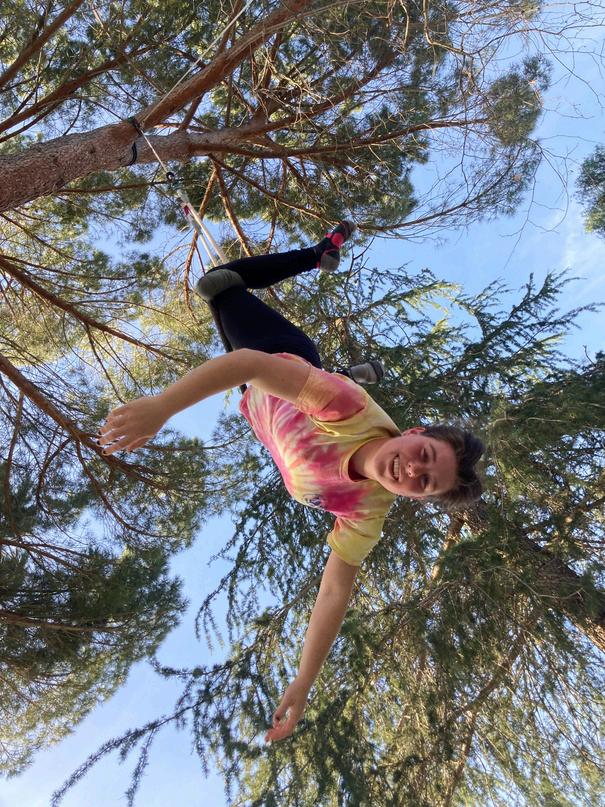
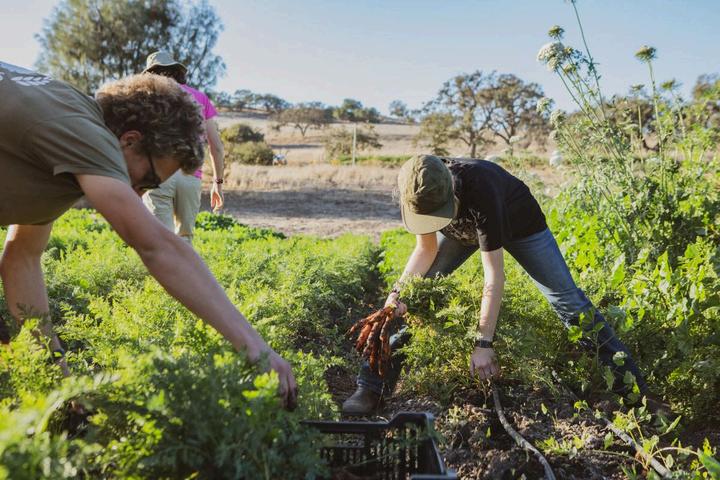
Farm Sport is offered in all three sport seasons at Midland and is one of the avenues that students can take to complete their Farm requirement for graduation. On the farm we grow food for our community, both annual row crops and fruit in our orchards. Farm Sport students are involved in all aspects of production and learn the basics of growing their own food by tracing their hard work from the farm to the table.. They seed, transplant, harvest and process food for their community. Over four years, students’ awareness of the cyclical nature of raising food grows as they work and eat through the seasons on the farm. Farm Sport students experience the joy of working with their peers to accomplish tasks large and small. Student leaders are given the opportunity to manage their crews each day; exploring the skills and challenges of leadership and teamwork.
*Participation in a season of Farm Sports also satisfies Midland’s farm graduation requirement.
Students in Fitness, Running, Surfing, and Hiking (FRSH) connect more deeply with this place and the surrounding marine environment through a combination of these activities. Students typically surf at least once per week at one of our local beaches, such as Refugio, Jalama, or El Capitan. Students also build their fitness, learn basic surf technique, how to read waves, and how to manage their risk in the water. Midland provides all equipment necessary (surfboards, wetsuits, etc) and this sport is open to all, regardless of past experience.
The Horse Program teaches students foundational horsemanship using the principles of Natural Horsemanship with purpose-based riding to develop skills in and out of the arena. All participants learn preventative veterinary care, nutrition, pasture management, horse behavior, and groundwork. Advanced students develop skills in horse training and further develop their riding skills by learning to communicate with lightness and by exploring performance-based disciplines like cow working, cowboy dressage, drills, and trail riding. Students involved in the Horse Program have access to Midland’s 25 miles of trails, may participate in horse camping trips during the school year, and may help with ranch-related activities while on horseback.
Midland’s maintenance team remains true to one of Paul Squibb’s founding tenets – that Midland’s self-help plan “can give [students] a sense of pride in contributing to their own support and education, and can make them feel in turn that they are taking a real part in maintaining and building up the school” (Squibb, 1932). This team is exposed to new work challenges every day. Students leave each session – including myriad small building and repair projects – with the satisfaction that their work has benefited the school community. Outside of this program, there are other opportunities to help with maintenance projects, such as Sunday work periods and class projects. Skills developed on the job become useful tools students can use for the rest of their lives.
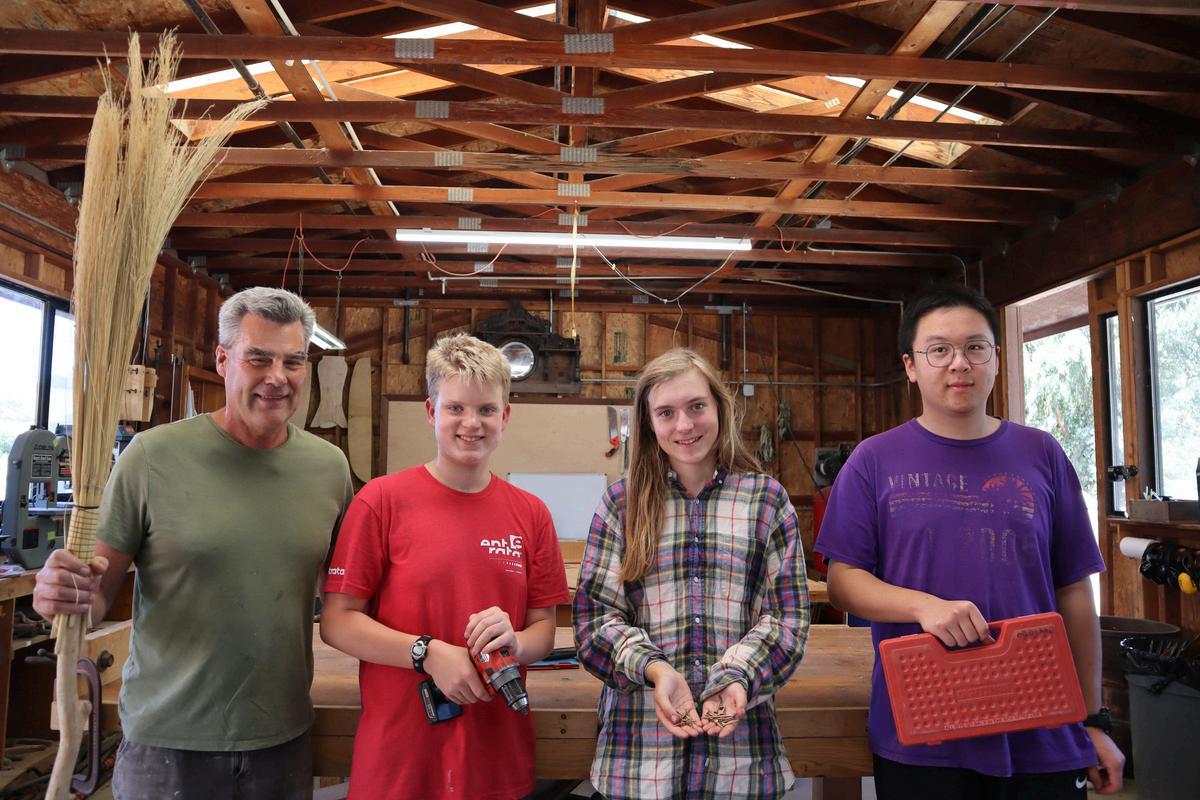
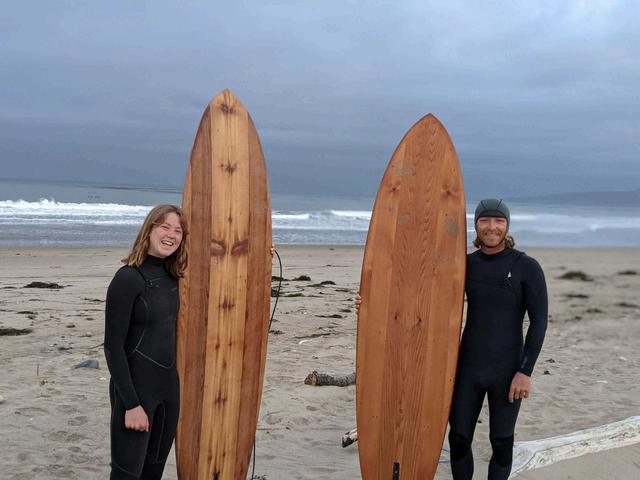
Outdoor Leadership is offered in the Fall and Spring. Tapping into the expansive natural landscapes within walking distance of Midland’s 2,860 acres, students develop skills and habits as hikers, backpackers, naturalists, navigators, trip planners, and ultimately trip leaders. Students also explore nearby beaches, coastlines, and adjacent wild areas, including Midland’s ten-acre inholding in the Los Padres National Forest, for day hikes, overnights, and longer backpacking trips. While cultivating habits of engagement with the natural world and management of risk in outdoor environments, these explorations require teamwork and provide genuine leadership opportunities.
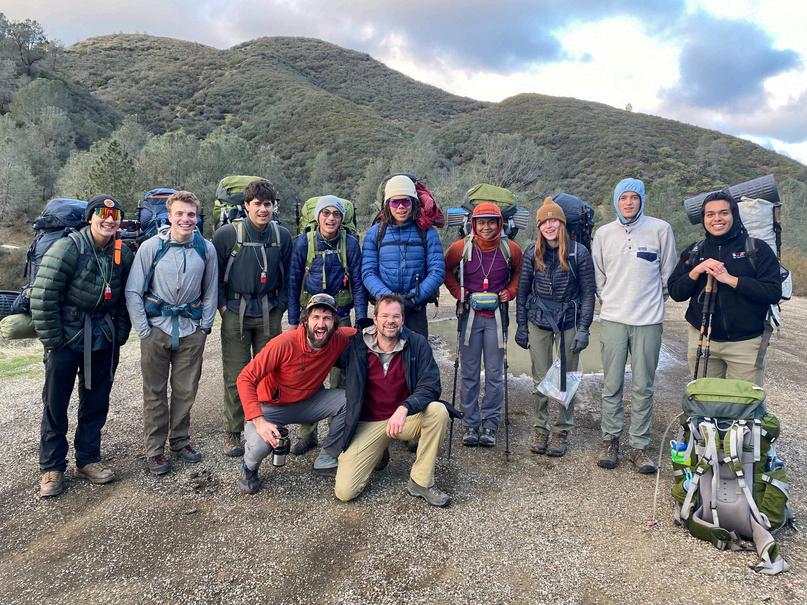

A Midland education provides students with a strong foundation – as learners and resourceful citizens – to get a good education anywhere. Ultimately, all students are responsible for their own education. The process of applying to college tests their readiness to take on this responsibility, and they must take ownership of the process. Midland’s college counseling program provides skillful support for this individualized journey by matching our graduates with colleges, universities, and gap year programs well-suited to each student’s individual interests, plans, talents, skill sets, and needs.
Midland often transforms the lives of young people and, in doing so, prepares them for college, where they will have a transformational experience of a different nature. Ideally, the college search process is also transformational because it forces students to examine themselves and to identify what they want from life and from their education. If students can truly understand who they are and what they want, then finding the right college becomes significantly less complicated.
The goal of Midland’s college counseling office is to provide the tools, resources, and support that will enable students to navigate this milestone, each step of the way. Midland sets the bar high for education and life beyond Midland. The transformational experience of applying to college, while serving Midland’s purpose of college preparation, ultimately helps prepare students for life.
The emphasis for the first years of the Midland experience is identifying and developing interests within Midland's program and over summer breaks. Academically, this is supported by enrolling in classes that a student finds highest interest in and encouragement around doing well in those courses. There are class-wide college counseling meetings, in which students can see the road map of what admissions teams will later evaluate when they reach their senior year. Juniors take both a Pre-ACT and PSAT in the fall of junior year, identifying which exam better plays to students' strengths. Midland students of all grades are invited to eat lunch with admissions reps in the fall to learn about a range of liberal arts colleges and bigger research universities from around the country.
The second semester College Counseling Seminar meets once each week to progressively roll out orient students to the college application process. Topics include: the college application calendar, resources to manage the process, GPAs, standardized testing, various types of applications, essay writing, college visits, interviewing, recommendations, and financial aid. All families have at least two individual meetings with the college counselor to discuss their own ideas, hopes, concerns, and questions about the college process. We encourage students to realistically consider not just which colleges they think they like, but also which might be affordable and are likely to offer admission. By the time they leave for summer break, they have filled out most of the Common Application, have strategies for approaching the personal statement, and have tailored colleges to research. Students will know how their GPA and test scores compare with the average admitted applicant for their schools and speak with earnest rationale to why and for what program they are applying.
Seniors return in the Fall with tangible questions about what they will do after they leave Midland. They must think critically about who they are, and they must be able to articulate whether and why they want to go to college. Armed with the necessary tools, the seniors focus on completing applications and finding the best ways to communicate the essence of who they are to colleges. 1:1 weekly meetings with the college counselor provide space and time to fill out applications, ask questions, and get immediate answers. Ideally, students will have written college essays during the summer, but many aren’t ready to write until the academic year begins. Students utilize many Midland resources to write and rewrite essays again and again. Standardized testing continues as needed.
The college application process challenges parents as much as it does students. While the focus is, necessarily, on the students, they aren’t the only ones experiencing a transition. Midland works closely with parents to make sure they understand the college application process, the important deadlines, and the tasks their child needs to accomplish next. Parents have responsibilities in this process, too – among these are the responsibility to complete the FAFSA and CSS Profile, have realistic conversations about family finances, to help students visit colleges when possible, to recognize when to step back and let the student take necessary ownership of the process, and to be supportive and patient as their child experiences this developmental milestone. Midland’s college counseling program utilizes SCOIR to send recommendations, transcripts, and the Midland profile. We always encourage open and frequent communication between the college counselor and families.
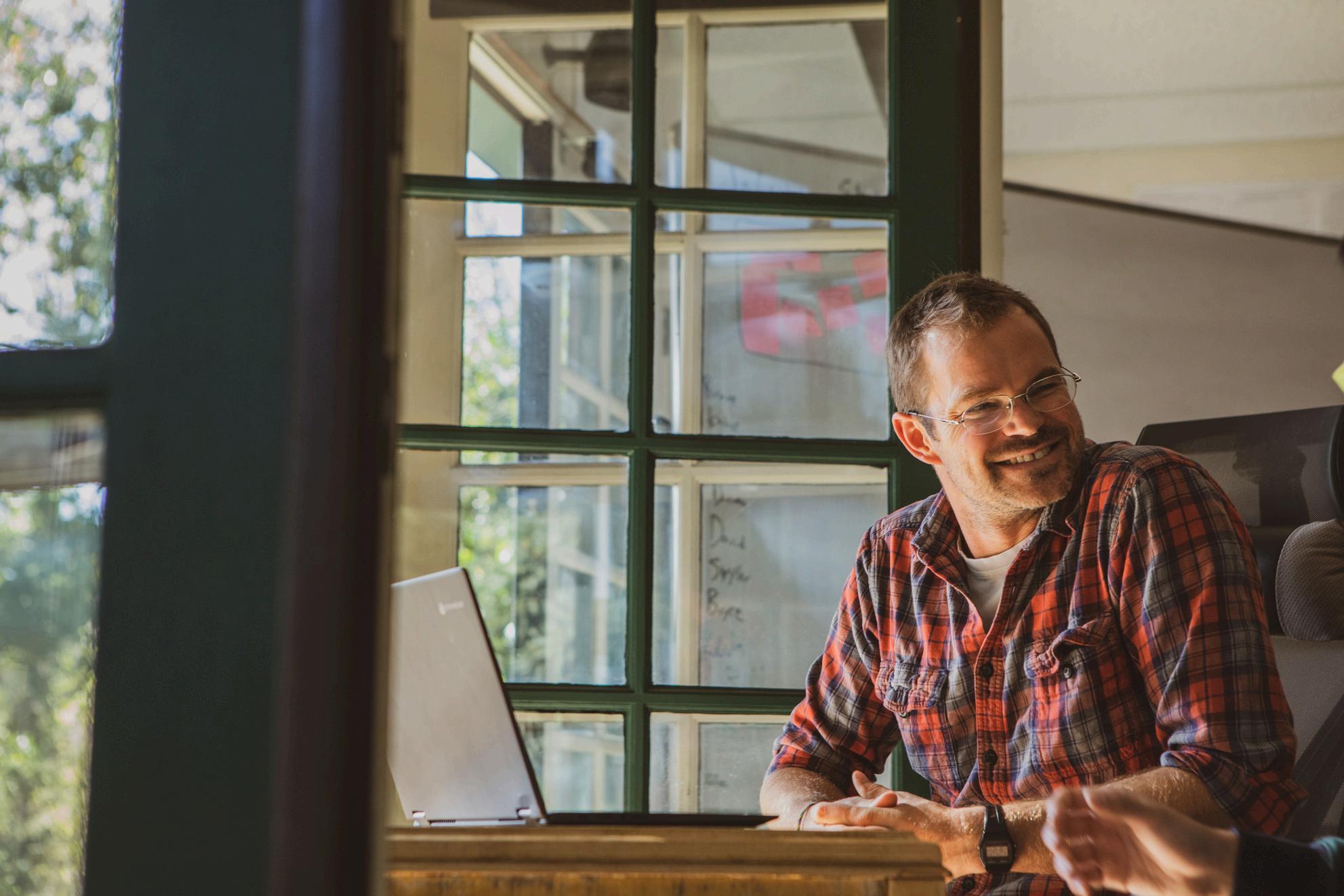
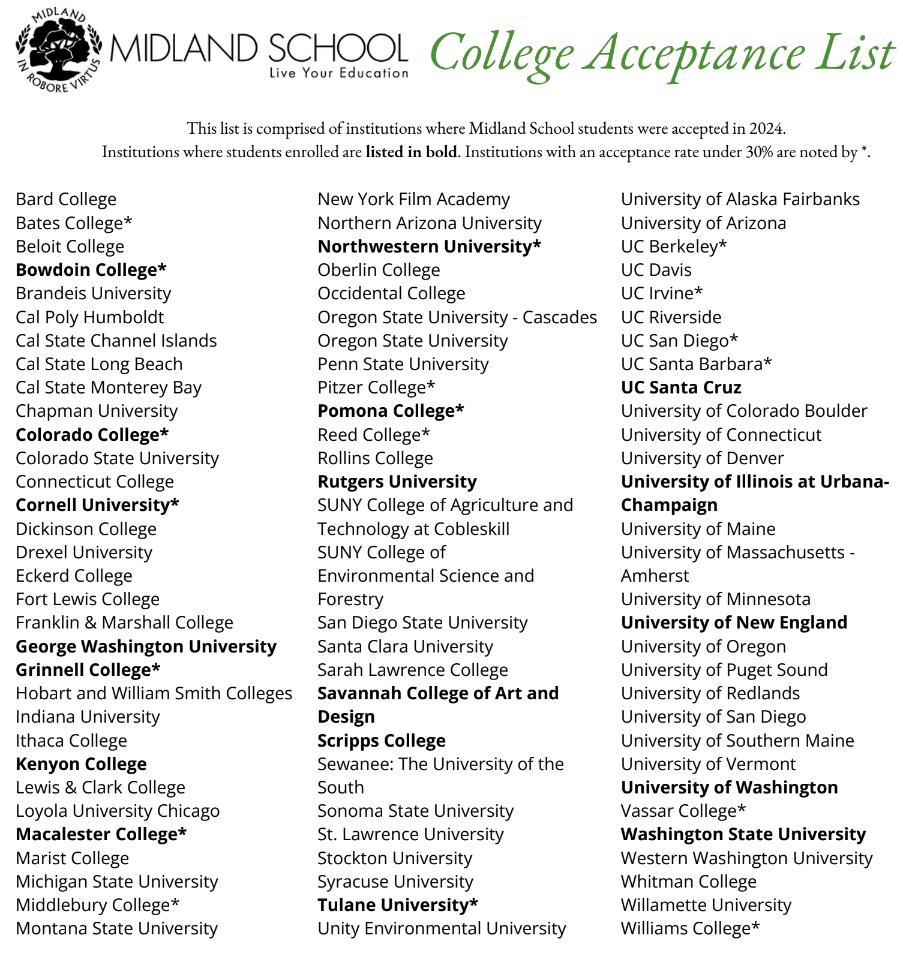


“Midlandis–firstandforemost–aschool. Arigorouscollegepreparatoryboardingschool. Notashopschool.Notatradeschool. Notanadventureschool. ThefundamentalrigorofMidland’scurriculum mustneverbewatereddownwithtripsorprojects thatdon’tputlearningattheircore. Ifyoubuildsomething,learnthescienceinit. Ifyouexploretheproperty,learnthegeologyandecology.”
BarrySchuyler‘41(1923-2011)
Midlandstudent,teacher,trustee,advisor,andbenefactor;aguardianof Midland’ssoulforover70yearsfromtheKeroseneAgetotheSolarAge